#and I hope it makes it seem more significant when something more revealing is shown
Note
Sorry if this is comes of strange, but I sort of love how Machete is always cleverly “censored” with your more intimate works involving him. Obscured might be a better word for it!
(And I’m curious if that’s always been the case 👀)
.
#thank you!#if you ask me sometimes thoughtfully placed censorship can make the piece seem more intimate and not less#and I hope it makes it seem more significant when something more revealing is shown#this is the case with most of my characters but with Machete and Vasco it's more noticeable#since Machete is private and modest and insecure about his looks#and Vasco knows he's a nice looking fella and is a lot more comfortable in his skin#answered#anonymous
277 notes
·
View notes
Note
Hiiii!!! I’m relatively new to ALNST (as in I watched it all in one go in one night and cried) and I was wondering if you have any opinions or information about this,
What do you think about Till and Sua’s relationship? Do you think they’d share anything in common? Do you think they’d like each other? I’d like to think there’s at least one thing they share in common that’s led to be on good terms.
Sorry this is a bit long, thank you!
First of all, thank you anon. I've had thoughts on this for a while! Thanks for giving me a chance to talk about it!
Till and Sua don't often interact in canon, so it's pretty easy to assume that Sua would hate Till's guts because of his crush on Mizi (especially since that art of Mizi playing with Till includes Sua looking jealous on the side, sulking in the next page).
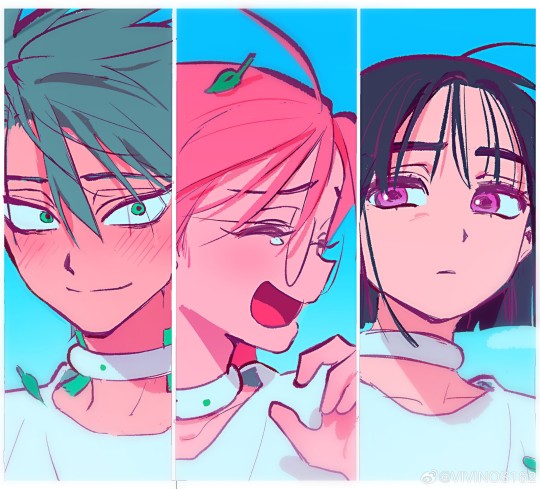
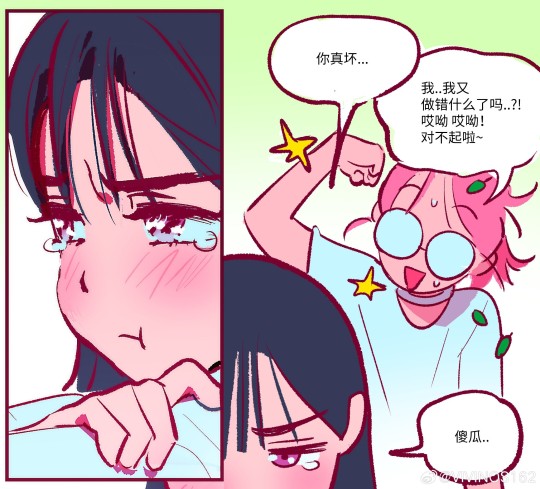
But something to note about the characters in ALNST is that they're actually quite respectful of each other despite the crush conflict (further seen by Ivan and Mizi being very friendly despite Ivan knowing Till loves Mizi). Everyone in the garden knew Till had a crush on Mizi, the goodbye notes state that it was very obvious.
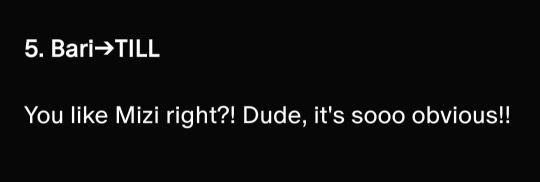
Yet despite that one instance of Sua pouting at Mizi and Till together, Sua is never shown to dislike Till. In fact, she seems to be more conflicted with Ivan instead. In the few official arts we have of them together, they seem pretty neutral.
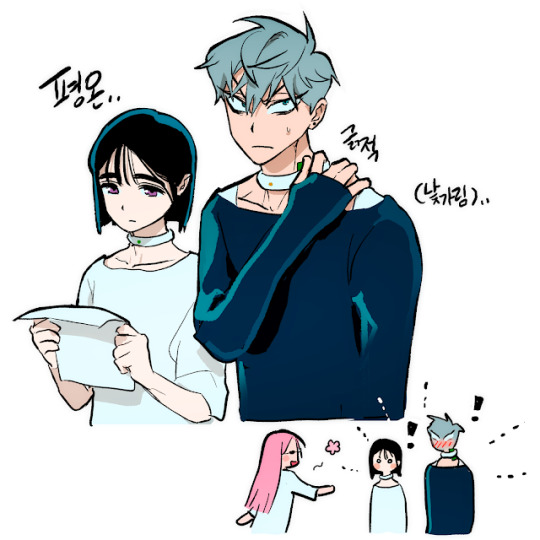
(Sua's collar is green, showing she's comfortable/doesn't mind Till. Till's collar is orange most likely because he's a little nervous/awkward.)
In the official Anakt Kit goodbye letters, Till and Sua write messages to each other. They're short and seem more of a polite gesture than an actual goodbye between friends, but nothenless it shows that they're pretty amicable. Till writes that Sua has a nice voice and that he hopes she gets a high score in Alien Stage, while Sua tells him to take care and that she'll see him there.
I think that Sua and Till actually have the potential to be pretty good friends, strangely enough.
As for similarities, there are quite a few!
The most significant similarity I see between Till and Sua is that they're both deeply sensitive. Due to this, they've developed different defense mechanisms in order to protect their feelings.
Till is actually known to be timid, rather closed off and "cold" to others. In an early stream, he's even stated to be the most timid character of the cast. He only reveals his energetic and fiery side when he's putting his full passion into something like performing his music, when he's provoked, or whenever Mizi is involved (she makes him "strong", the creators say). Of course this standoffish and aggressive behavior is a front for his softer, more vulnerable feelings. He was heavily mistreated as a child, which led him to become distrustful of most people. This plus other factors regarding his rebellious nature and more eccentric personality result in him being a "friendless idiot". Of course, once people get to know him they'll find that Till is actually quite the sweetheart, albeit a bit awkward.
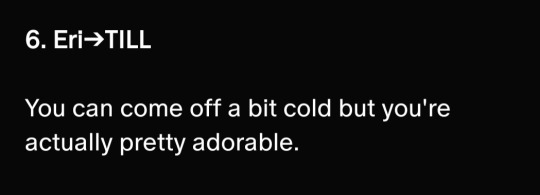
Sua is quite similar in this way. The creators describe her as soft-hearted, which is why she tears up so quickly in the IvanSua comic and the aforementioned art of Till and Mizi playing together.
Sua, just like Till, seems to be mistreated by her alien guardian. Although to a less violent extent than Guardian Urak, Sua's parent is seen to aggressively handle her without care, grabbing her by the head and shoving her forward. She's also placed in uncomfortable clothing and neglected without consideration for her own feelings. It may be due to this cold and lonely upbringing that Sua learned to hide her emotions as a coping mechanism.
It's been said that getting to know more about Sua is very difficult, as she's closed off and only ever opens up to Mizi. She seems cold on the surface, but the truth is she is hiding her sensitivity so that she won't get hurt. Sua is also very timid in nature, seen in how she only writes in the corners of people's yearbook pages with small font, putting in extra effort to not take up too much space.
But just like Till, Sua has her bolder side. Occasionally she's known to say very blunt and suprising things that other people would not expect of her, and she feels very deeply for the people she cares about. Sua may be the more cool and collected half of MiziSua, but we must not forget that she was tender-hearted to the point where she could not imagine living a life without Mizi in it, thus her sacrifice.
Both Sua and Till's original colors are white, and both are the only characters in the main cast who have ear piercings/earrings. They're both prone to tears and play the role of "god" in their respective relationships.
Something I really like about the ALNST offrec/actor AU is that among all the characters, Till and Sua were chosen to be the seniors!! I found it really cute! Sua, who is the most petite and smallest of the cast + Till, who in canon is the youngest in age. These two are actually the experienced seniors of the actor AU! It's so fun to me lol
Anyways, sorry for all of this, maybe it was a bit much, haha. Till and Sua are my two favorites, and I've always seen similarities between the two of them. I think there's similarities across several of the characters in ALNST, actually, which I hope to talk about in the future!
Thank you for the ask!!
#ANYWAYS THIS IS THE START OF MY IVANMIZI/TILLSUA BESTIES AGENDA#alnst#alien stage#alien stage till#alien stage sua#asks
133 notes
·
View notes
Text
Ch 155 review:
woke up in the middle of the night and wrote ANOTHER huge bulk of a post, I'm having so much fun with this but maybe I should return to drawing persona fanarts again because I.. I'm pretty hopeless regarding mysteries but!! Here are my sincere thoughts about the latest chapter in more detail! I should really keep quiet till things clear up more. I believe so, but it's been really fun to hop into an ongoing series
This was originally written in a different language, then later translated through chatgpt. Chatgpt is so cool; ah I'm really sorry about what it does to the environment though; I won't use it a lot;
I hope to write quality content for those who love this work. That's how I feel. Haha. Well, I find it difficult to write forcefully, so at least I can say that I'm writing based on my affection. I'm not writing to get recognition(although it'd be nice).
Ah~~~.. Hahaha. For this episode's development, I realized how foolish I am because I forgot about Nino! But honestly, how was I supposed to know? That character, broadly speaking, might have contributed to Yura's death, but there was no indication that they did anything related to Goro's death. I don't watch many mystery shows, so when I made a plot guess last time, I dug a hole for myself in another post:
What I can't predict is what's going to happen next. There are too many variables and too much undisclosed information. As new information that hasn't been revealed yet comes to light, it makes it really hard to know.
Just like that.
The first emotion I felt after seeing the chapter was "?". What is this?? What are they trying to do?? And then, I felt really sorry for Ai. There's no sane person around. The person who definitely contributed to her death is her ardent fan (though I think even the term "fan" is too generous for that person). The suspected instigator is her ex-boyfriend or a colleague from the same group... there's really no one she can trust. Even though Ai hid many things and didn't show her true feelings and lied, it seems understandable, doesn't it?
I don't have any major speculations about Nino, but what I've understood is that the character "worships" Ai with some very twisted feelings. If there's a character who wants only the good sides of Ai to be shown to the world, it would be this one rather than Kamiki.
When I delve into analyzing the characters' emotions related to the story, I felt the part that needs explanation is Goro's death. Since Goro's death happened before Ai's death, the interpretation can vary greatly depending on whether it was intentional or just an accident. While many might focus on Yura's death, which is indeed very important, at least you could attach some psychotic criminal's delusional reason to it later. For the case of Goro's, however, it'd mean that there might have been someone other than Ryosuke already working against Ai behind the scenes before her death happened. Whether there were more people dissatisfied with Ai and her children other than Ryosuke is significant in determining how much it contributed to Ai's death.
I've been watching all along, but it didn't seem like Kamiki was involved in it, so I was confused. So, I think we need to sort out this part. This character doesn't seem to have much aversion to the fact that Ai had children, and there doesn't seem to be any reason for him to. From the moment he referred to Ruby as "indeed our child" in his first appearance, I got the feeling that this character recognizes the twins as something resulting from him and Ai, something between them, and doesn't view it so negatively. In that short sentence, there was a faint sense of affection. He doesn't seem to dislike being connected with Ai in one sentence, and the fact that there are children between them doesn't seem to be a bad thing from his perspective. You might think I'm overthinking based on one short sentence, but it's not just that; overall, his attitude when he actually appeared in front of the twins doesn't give any sense of dislike. The clincher was when he casually mentioned in chapter 153 that he has a father's heart. I thought, oh, this must be right.
Therefore, if Goro's death wasn't just an accident, I don't feel that this character would have any reason to harm Goro, who tried to protect Ai and their children and ensure their safe birth. (It could be explained as him being petty and harming Goro because he didn't like anyone else being close to Ai, but I think that's highly unlikely.) However, it still feels a bit off to think that Ryosuke acted alone to hide the body and everything else related to Goro's death.
If Nino were involved, it might make things clearer in this regard. But I don't know how insane Nino is (though She seems to be in very bad shape). I think there was some truth to the psychology of Nino that Kana portrayed...
B-Komachi, which was her and Ai's group, was going to perform at the dome, right? Which means Ai's career is shining even brighter even further. So what would this character gain by harming Ai at that point?
Ai did have a desire to reveal things about herself, though. Maybe this character wanted to stop her because he knew she wanted to expose things about herself and stop being the perfect idol worthy of worship?
From Kamiki's perspective, I think Ai revealing things about herself, especially if it was before the dome concert, might not have been such a bad thing. When the children were about four years old, he still wanted to get back together with her. If Ai had said, "I want to try liking someone, and I have children," then his career might have been ruined by the scandal but he might have been happy thinking, "Oh, Ai had feelings for me to that extent." She's THAT important to him, I believe.
But for Nino, it wouldn't have been the same, would it?
What keeps coming to my mind now is this lyric from Mephisto:
叶かなわないならばあなたになりたい
"If I can't make my wish come true, I want to become you."
Could it be that Nino wants to be like Ai, or even become Ai herself?
She's the one who's expressed her desire to be her (as portrayed by kana in ch 136)
Even if you view Mephisto's lyrics from Aqua's perspective, it doesn't seem like Aqua would say, "I want to become Ai." Of course, it's a powerful lyric expressing longing, so it resonates strongly emotionally. But their genders are different, their fields are somewhat different, and while Aqua seems to have a longing for the entertainment industry, he also tends to deny it.
Or it could be this: Seeing Nino's erased all the other members except herself and Ai in the poster, (she didn't erase her own existence) perhaps she might believe the one to be beside Ai is her and her alone? That might be how she thinks. :/
Adding one more suspect broadens the possibilities, but it seems like Akane and Aqua will explain everything on their own, so waiting might be safer. My guesses probably aren't going to be correct anyway.
What I can talk about more is Kamiki's reaction. Although it was a very quiet reaction, in some ways it was stronger than I expected because he accepted Ai's words completely. From his perspective, he was receiving a message he couldn't have imagined for fifteen years. There was no negative reaction like "No way, she's lying." He simply accepted, as in "I didn't know this," and remained silent.
In another post, I wrote my predictions for him like this:
If the songs are clues and there will be some kind of conflict in the future,
Just as Aqua has been doing things for Ai for years, this character might have been doing things too, and it's probably almost complete. His mindset is that as long as he accomplishes this, it doesn't matter what happens to him. He was planning to meet Aqua and see his daughter once before turning himself in.
But when he realizes that Ai, whom he truly loved, actually loved him back, he might feel like he's losing his mind.
There was a line he couldn't cross, thinking, "Okay, let's not do this," but now, having seen the video, he might cross it. Because he misses Ai so much and she's so precious to him, now he really wants to save the person he loves who also loved him (it seems like he's doing something to save her/see Ai again. Otherwise, the songs wouldn't be like this).
If he thought Ai didn't love him, his feelings (assuming he didn't intentionally kill her) would be guilt, obsession, and love-hate, so he wouldn't have any energy left. Because he has no attachment to himself, he'd have a resigned attitude like, "Alright, let's do this and die," and that's why he easily decided to turn himself in and show up in front of his children.
But if Ai loved him and actually wanted to be with him all along? Then if he was doing something for Ai, he wouldn't be able to give it up. So while he still has no attachment to himself, he might suddenly gain the energy for more extreme actions.
(I'm a bit disappointed that I couldn't accurately predict all the emotional reactions.)
Instead of "losing his mind," it seemed closer to sinking and submerging... It looks like he was someone who could have understood Ai well if only he had the right opportunity.
But I did get it right that he wants to do something for Ai.
Actually, the speculation I wrote above was a bit extreme, thinking that, since it's a manga, the development might be more intense. So, it was a scenario that I didn't really think would happen! Considering the character's personality, I thought he would suffer greatly. That's as far as I thought (with the current information revealed, I'm still withholding much judgment about this character).
But he seems so precarious. I'm worried he might be found dead somewhere... I'm still questioning whether he's someone worth worrying about,
But I don't think it's zero possibility that he'll end up being a very pitiable character.
He's saying he'll do something for Ai, but what could that be? He himself is determined, but Ai is already dead.
Even if Ai has become a star and is watching over him, would she want him to struggle? If he really killed her, she wouldn't want him to do anything invoking her name as a murderer. But if it's truly a misunderstanding, then she wouldn't want him to suffer anymore.
The video Ai left contained a message asking Aqua and the others to help this person, so I think the latter is more likely. Although the video was recorded a long time ago, this is a manga. The timing of when a message is revealed is important to the development. Since this story has come out in the final chapter, I think there might be a situation where the main characters end up helping him...
No but, if Aqua just let this person go, and if Kamiki turns out to be a murderer, that could be extremely irresponsible, right? Even if he let him go, shouldn't he have recorded the conversation and reported it? He should have recorded it and reported it, but maybe he couldn't report it because it happened when Kamiki was a minor? But wouldn't he have been around nineteen when the kids were about four? Is it something too ambiguous to report? Still, the next story that gets mentioned involves at least three deaths. How can he calmly, perhaps leisurely, discuss with Akane that Nino(and him) was involved in the deaths of three people? You never know what a criminal might do if they're cornered mentally.
He said he was going to do something for Ai. If that something is killing people, then it's dangerous for Aqua to just let him go. But since Aqua did let him go, it seems like he doesn't think that's the case.
So, the theory that he committed serial killings to ensure no one surpassed Ai is probably incorrect.
Additionally, there's no mention anywhere of serial killings actually happening, right? It could just be those three deaths. That doesn't mean he's not a murderer. If there had been serial killings of celebrities, it would have been mentioned in the story, right? There should have been some hints, like someone saying, "Hey, this actor who was doing well suddenly disappeared," but I don't recall anything like that. It would have been better if there had been at least some hints. Everyone naturally speculated that he might have committed serial killings to ensure no one surpassed Ai, and based on the way the scenes were portrayed, it did seem that way. But since it hasn't been mentioned so far, it could be that such events never happened.
The mention of bearing the weight of lives came up when the Uehara couple died. Kamiki was very distressed, saying, "Do I have to bear even that?" He seemed to be thinking that because of him, Ai died, and so did the Uehara couple, and now an actor has died too. He seems to be self-deprecating, thinking, "Yeah, someone else died because of someone like me." His way of speaking is really strange though... Is there a reason why he feels he needs to elevate the value of his own life?
When I saw the lyrics of "Fatal," I thought, "This is it," because it hints at "something that needs to be filled." What can fill the void? As the lyrics suggest, "a lack of Ai", it seems to be Ai. If you look at the song alone, it’s about wanting to revive someone he really wants to see, right? "Mephisto" is the same, and since it's a double hit, I thought, "Ah, then that's it. That's why he's moving."
あらゆる望のぞみの総すべてを叶かなえたら ああ果はたせたら
"If all wishes are granted, if they come true,
あなたに会あいたい
I want to meet you.
星ほしに願ねがいをかけて
Wishing upon a star"
Anyway, stars are important. I noticed that stars appear quite often in the manga.
When I first heard "IDOL" and sometimes when I hear certain songs for the first time, I feel an overwhelming rush of emotions. It's a really amazing and exhilarating feeling.
However, if I listen to the song repeatedly, that emotion dulls, and I become less sensitive to it over time.
When I first heard "Fatal," I felt an immediate and intense sensation. It was as if someone was desperately searching and longing for something immensely significant. As soon as I felt that emotion, I instinctively thought, "This must be it," and it struck me so strongly that it became the reason I've been writing a lot lately.
The songs from Persona 3 were like that too. However, while Persona 3's songs had a warmth that supported the heart, a sense of resolve and determination, the songs from this manga feel like they are heavily spiced with MSG. The intensity of the emotions is incredibly fierce and strong. So, I often find myself wondering, "Is this okay? Is this okay?" But then I realize, yes, this is the kind of emotion being conveyed. It's raw but in a different way.
Considering the emotions that have been flowing so far, I felt strongly that Kamiki must be the one that's being depicted. Does anyone else feel similarly to me? Haha. So, I was just observing till that point, but then I couldn't help but dive in, thinking, "This has to be it."
These days, there are so many horrifying, disturbing, and distressing news stories, and it feels like the sentences given to offenders only add insult to injury for the victims(it's very short and light here). I hate it so much. I wish the term "dating violence" would disappear; it should be replaced with another term because that's not love.
So, while watching the developments in this manga, I feel like... I really don't want to empathize with or sympathize with the perpetrator, even in fiction. I understand that fiction can be separate from the reader's morals and I respect that, but when I think about the emotions between the characters in this manga, it doesn't feel like it's the same as those horrifying real-life cases. I really hope it's not. I'm not looking for it to not be like that on purpose; it's just that something feels off...
When watching the scenes with Ai's video, at first, my heart ached, but as time went on, I kept thinking, "Kamiki, you better get your act together." If this character has done things worthy of criticism, I absolutely don't intend to condone those actions even a bit, and I believe they should pay for their crimes!
But I think it's okay to wait and see for now? Am I really the type to get easily fooled? Haha. Still, I believe I have a good sense of understanding when it comes to emotions... I got Aqua and Kana right, and maybe that's why I got excited and gained momentum. It was exactly as I thought, for their case.
Well, we'll have to wait and see. I'm going to stay quiet for now. But if I'm going to draw fan art, I need to have a clear understanding of the emotions, which is important to me. If I can't predict what this character is feeling, I can't touch it.
Kana is really great in this regard. She's a character who doesn't need to overthink, so it's really comforting. While everyone else is complicated and holding secrets, leaving me to wonder "when the heck did you find out about that?" having new conversations among themselves, Kana is relatively easy to understand... what you see is what you get.
Or Ai, since she's shown almost everything (there's one video left), I might be able to do something with her too.
I liked the character Akane because of the profiling scenes. It didn't feel entirely like someone else's business because I do some degree of psychological analysis on the characters I handle. So that could maybe be why the range of characters I can manage isn't that wide depending on the genre. I usually focus on less than 5 characters and examine them REALLY deeply. The types I can understand and handle well are quite distinct for me. However, I want to dive deeply into the characters I do handle.
To create proper fan works, you need a lot of pieces of the puzzle. I might end up being off the mark, but I'm still doing it seriously when I make fan work!
I'm very happy when I hear good comments regarding such area :) I really want to do a good job. For now, I will stay on watch and see how things play out for now.
+

I thanked chatgpt :) :) aw they're nice (although they don't have feelings they've been helping me from rewriting things twice)
#oshi no ko#oshi no ko spoilers#spoilers#hikaru kamiki#hikaai#whatever you're up to hikaru get your act together#ai hoshino#you better not let your gf down and I actually want to believe you want to do good for her. I felt you were earlier#that's why I jumped the gun and started drawing you know!!!#DO NOT LET HER DOWN#oshi no theories
8 notes
·
View notes
Text
hello i just finished jedi survivor and i am in pain. this post contains spoilers do not read if you haven’t finished the game <3
here’s a penny for my thoughts that no one asked for.
is anyone else thinking that cal has turned to the dark side by the end of the plot? bc boy i sure am and it hurts to think abt 😩
i just - agjshsheje. something about the fact that he doesn’t turn to face cere’s force ghost when she visits him. like we know force ghosts aren’t invisible, probably mostly shown to those who weld the force and those they were close to. AND THE FACT THAT HE SPENT AN ENTIRE NIGHT JUST WATCHING THE BURNING? that cannot have a good effect on anyone lmfao. i don’t know why but something about cere’s apparition at the end just gives me bad vibes, as in i’m kinda thinking it wasn’t really her. i’m feeling it was the dark side of cal imagining her there. i think i thought that probably because of the weird fucked up warped sound they used when she appeared. and also how cal’s so determined to kill bode… like he didn’t seem to care that kata was in the room with them after some point. also cal’s meditation spots being dark and scary when you went into skills. MAYBEEE i’m looking too deep into it but like. what if.
ok update i finally got past the end credits WHAT IS THAT MUSIC AT THE END OF THE END SCENE??? IT DOES NOT!!! GIVE ME GOOD VIBES WTH. WE ALL KNOW MUSIC IS HELLA SIGNIFICANT IN STAR WARS. I -

anyway. i think that if cal hadn’t really turned by then, he was on the way or kind of in a mace windu spot with the force if you know what i mean. like working towards balance but struggling with… balancing it. LMAO my brain is braining i need to figure this out 😩 now i want a third game dammit. dark side cal would be devastating to play through but. give me the angst
also listen ik he was a “bad guy” and we’re supposed to not like him but i’m SO SAD over bode. i don’t know if i ended up liking bode sm bc he shares a va with charles smith (rdr2) but I MISS HIM (before his villain arc reveal ofc) </3 also kata makes me sad too. she lost both of her parents and has to spend however much time with the man who killed her father. can’t imagine that’s the best way for a little girl to grow up. kinda hoping that in the third game (if there is one) we play partly in cal’s perspective and partly in kata’s. i just want to know how they would work together. give me the tea, give me the drama. i’m here for it.
not really i can’t handle any more pain but you get what i mean
#jedi survivor#jedi suvivor spoilers#cal kestis#cere junda#im going fucking feral#i NEED TO FIGURE IT OUT#I’M NOT OVERTHINKING THIS RIGHT???#PLEASE TELL ME I’M NOT ALONE#anyway gn#got a good cry in
11 notes
·
View notes
Note
Hey Nico! How's everything? Hope you're doing fine. I've been a fan of your blog/replies/analysis for years, since 2017, I think, and sometimes I skim through your replies because we agree on basically everything about BNHA so it's really comforting to me coming here to your blog. I hope you still like this manga, re-reading some asks made me think that through the years your replies have gotten more and more uninterested, so I was guessing if you still like it? I hope so, it'd be (1/2)
(2/2) very sad to lose someone like you in this fandom 😭 anyway, I wanted to ask you something else too: I recall your disliking for Best Jeaniat, one of the things we both agree on. Did some of the latest scenes he had with Kacchan make you like him a little more? I'm... kinda 50/50. I appreciate that he's there taking care of Kacchan's corpse as much as he can, but... eh. That whole "I see you as an experiment" really stuck with me 🤨. What do you think? Wish you a great day!
if i seem disinterested i think it’s partially life getting in the way and partially me realizing i need to not burn myself out keeping up with fandom stuff and trying to have something to say all the time. not that i've lost my interest or that i don’t want to still do analysis but rather my thoughts about it would get too mixed up in discourse that sometimes it gets in the way of me just enjoying what i enjoy about it and generally when i do some kind of analysis post it’s either because i’ve been prompted by an ask or it’s in response to something i saw other people say but i’ve kept myself increasingly insulated from the fandom so i end up feeling like i don’t have much to say. and tbh sometimes i just get a little bored during big ensemble arcs like the war arcs lol BUT!! i assure you if i no longer had any interest in bnha i wouldn’t be bothering to keep up with the manga
now a bit of a rant to answer your question:
in the broad strokes of the story i'm impressed with how much compassion bakugou's character arc gets handled with. he's still responsible for his own actions of course but at the same time there's a lot of emphasis put into showing how much of his behavior and the things that happen to him are the result of how the adults around him have failed him and yet on a micro level so often are bakugou's feelings invalidated or played off as unreasonable for the sake of comedy or is adults disrespect for him glossed over for some cheap appeal to emotion
like that little bit in the middle of the paranormal liberation war arc where snapshots of deku, bakugou, and todoroki's families are shown and mitsuki's looking through a scrapbook of pictures of bakugou feels especially egregious to me. i in no way doubt the sincerity of her love for her son but it's just a teeny tiny bit difficult for me to care about their relationship when their one singular onscreen interaction involves her mistreating and belittling him, y'know?
when it comes to best jeanist, personally i'm still not over how he treated bakugou and i wish there was more acknowledgment of that but i can maybe take the whole hero name reveal as a sign that he understands he didn't Get bakugou and it's not like i'm mad that other characters care about bakugou's wellbeing lol but that being said, when the narrative tries to frame it like bakugou and best jeanist have some significant bond on par with other mentor/mentee relationships in the story it just feels hollow imo
TL;DR have my feelings toward best jeanist changed? not really lol
14 notes
·
View notes
Text
Seduction: a war between want and fear
I kept thinking again and again at how it felt like there was a complete switch in Vegas after he winds up harming himself, how at first glance it could feel like the scene before and after are in complete disconnect, how they could feel disjointed. And then also about how Vegas seems so surprised by Pete’s kiss, how it feels like he was not really expecting it. And all that made me look deeper and then it clicked.
Vegas talking about his life and the seduction scene are connected .They are connected on a deeper level because one is a consequence of the other. And not only those two scenes, but the hedgehog’s death too.
@lutawolf pointed out to me that it was during this first scene that Vegas fully realised that Pete had feelings for him because he looked at Pete and cried harder because he did not leave, even though he had the possibility and so for the first time there was someone who remained.
The next scene has Vegas being completely vulnerable with Pete, confessing his inner and deeper feeling, leaving him completely bared and vulnerable in Pete’s eyes.
What I found pretty telling is that the scene begins with Vegas saying “Why didn't you run away?” and then “Everything that I love left me.” and then “Leave me alone.”
Because again Vegas does really believe he is not worthy of love, that he will not be chosen for who he is, and what he feels for Pete makes him so very scared because love for him is not permanent, because everything he loves leaves him, just like the hedgehog did.
And so like @hael987 said so much better than me “Vegas’ belief is that his true self is unworthy, undesirable, and no one could ever choose him. But also subtly he’d started to hope. Pete's tenderness and staying has made him hope. He /hopes/ but he doesn’t actually /believe/, and so he’ll put an end to this ambiguity, this vulnerability, these scary new feelings Pete evokes, by going for Pete and creating a situation that he believes Pete will never respond to, that Pete will turn away from.”
The shift comes across to me as Vegas’ way of lashing out, because that is what he does when he feels threatened and unsure and he feels too much, like he does after they talk about their fathers or the blood type conversations . He will lash out at Pete and in this way he will prove to himself that all his darkest thoughts about himself are really true. That nobody could ever see all the darkest sides of him and love and accept him as a whole.
But as always with Vegas, everything he does and says has layers upon layers. Because what begins as his way of lashing out suddenly becomes something completely different. Because the need to be chosen is bigger than the fear, and there is yet another shift from lashing out to desperation. Because this reads to me as a struggle between what he wants and what he fears.
Because the way Vegas says “How do you like it?”, the way he keeps trembling for the whole scene after is so much more significant. Because he will put himself out there, all the while believing that even if Pete does have feelings for him, they will never have a positive outcome.
Because Pete has no reason to give in after all Vegas has done.
And so he will use this seduction as a weapon to finally reveal an answer, and he still fears it will be a rejection but at the same time he cannot help but hope it will be positive.
And in the end, he leaves the choice completely in Pete’s hand and he turns away because he still believes that after having shown his worst nobody will find him worthy of the trouble.
And he cannot bear to face what the outcome will be. And so when Pete does choose him first there is disbelief, and then rejoice and elation because finally, finally someone did choose him. Because
“momentary disbelief because he was wrong, surprise because he gets all he ever wanted, surprise because the hope was based in reality, it’s real and it’s his now.(@hael987 )”
“That surprise and smile said it all. Oh you do pick me , oh thank god, you pick me (@lutawolf )”
Because this is what he feared he would never get and all he ever wanted: to be chosen and to be loved as a whole, for the worst and the best that he is.
All of this post should be considered as a labour of love from three minds, I just put it together.
Dedicated to both @lutawolf and @hael987 because they mean the world to me.
#all the merits should go to Lutawolf and Hael#because they are both the very best#ella's cursed thoughts#mixed with wonderful thoughts from two wonderful minds#vegaspete#kinnporsche
240 notes
·
View notes
Text
A meta and analysis on Takaishi Takeru

Of all of the Tokyo Chosen Children, Takeru is lucky enough to get significant attention for two full series from beginning to end, and his character also goes through some drastic changes in the process, especially through Adventure and 02. There’s so much going on with him that it makes it hard to give a short answer to the question “what is Takeru like?” because there’s so much you could say about him at so many different times.
Fortunately, that’s what we’re here to talk about today!
Takeru in Adventure

At first glance, Takeru seems to be the “tagalong kid” -- the obligatory “little kid character” you have whenever you have a party in a fantasy story. Generally, these “obligatory kid characters” are the kind constantly struggling to catch up with the older ones. Adventure being a series that loves to play with tropes and expectations, though, very quickly says no to that.
Seki: ...We also mixed up the children’s ages, for a bit of variety.
Kakudou: The oldest one would be the most unreliable, and the smartest one would be one of the third youngest. Just a little to throw you off the usual, conventional track.
Seki: The youngest one would feel too much like a burden to everyone else, and conversely would actually have himself together.
Takeru “doesn’t want to be a burden” -- meaning his feelings on this issue are actually rather much like Hikari’s. Unlike Hikari, though, Takeru reacts to this compulsion differently -- instead of simply repressing things and pretending the problem doesn’t exist, Takeru’s reaction to his own negative feelings is to “have himself together” and act as if he’s got everything under control.
Or, more accurately, pretend he has it together and has everything under control.
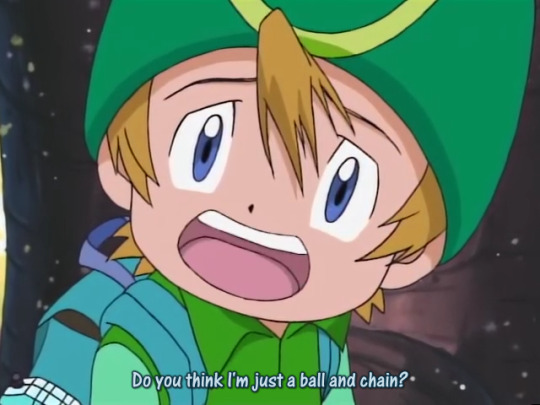
Takeru, for all intents and purposes, was not supposed to be on the camping trip the others were on, not having gone to everyone’s school -- he had to get special permission to go. Takeru’s family is very, very split harshly at this time, with his mother not even able to treat Yamato comfortably. Yamato deals with the familial estrangement badly -- alternating between approaching everyone awkwardly and exploding like an emotional fuse bomb -- but Takeru tries to take it as a sign that he needs to be “responsible”. A lot of his actions in Adventure are him basically exuding this aura of “I can take care of myself!”, and in fact he works very hard to “assert” himself as if he were yet another peer. We even see him make the complaint directly in Adventure episode 43 -- while he is correct in calling out Yamato for coddling him and him only while recklessly disregarding the others, the fact he specifically complains about Yamato approaching him as someone holding them back if he’s not protected reveals a lot about his own mentality regarding the situation.
One of his first major scenes in episode 2 is him offering his own food for the pile of supplies everyone has, even though it’s just snacks. Which is, probably, a pretty accurate summary of Takeru’s character at this point: on the surface he’s responsible, well-behaved, and capable...but, in fact, he’s still about as immature as an average eight-year-old child would predictably be.
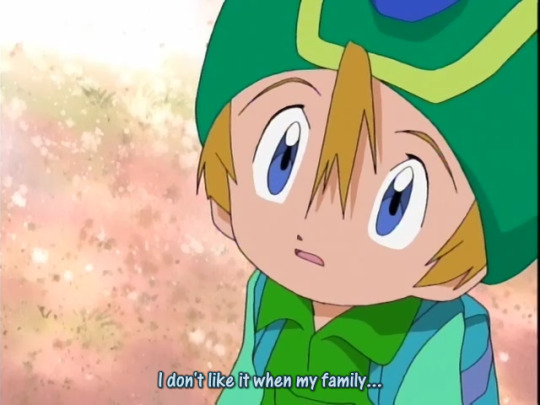
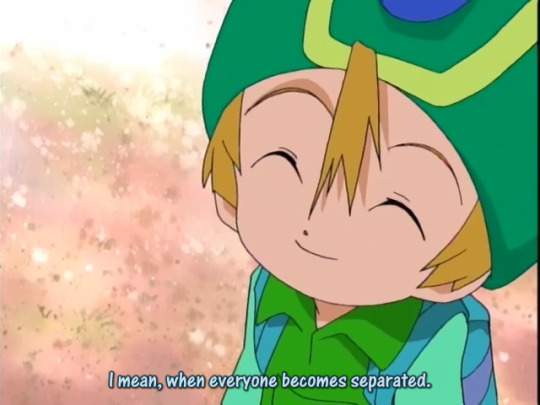
Yamato spends his Adventure character arc pretty openly angsting about his relationship to Takeru and how his family’s split has affected them, but throughout the entirety of Adventure (and, eventually, 02 as well), not only does Takeru rarely if ever touch on it, there are indications that Takeru deliberately tries to dodge the subject or not dwell on it too much. In Adventure episode 12, he actually outright lies to Patamon about his younger childhood memories, claiming he “probably doesn’t remember” anything about it despite the audience very clearly being shown that he very much did, and in episode 26 he comes very close to leaking his actual feelings about the group being separated being tied to what happened to his family, before quickly covering it up and trying to move on with the topic.
In other words, unlike Hikari, who knows exactly what she’s feeling but is compulsively unable to vocalize them, Takeru actively suppresses his negative feelings and tries not to dwell on them too much. Again, this comes from his desire to “not be a burden” on others -- he’s got this situation under control! Everything is fine!
And this has a very, very nasty payoff. While Yamato clearly deals with his emotional issues badly, tending to get very explosive about it, Takeru’s way of coping isn’t actually all that much better in the long run, because Yamato’s frustration and openness about his emotions at least lead him to being very straightforward about his feelings, incredibly self-aware and sometimes even self-conscious, and ultimately able to get at least some degree of catharsis from the situation. Takeru...not so much.


Takeru is a child, no matter how much he tries not to act like one, and it ultimately results in him reacting disastrously whenever something hits him too emotionally hard -- which results in Takeru suddenly becoming irrationally stubborn and even angry. We later see what it takes to actually break through Takeru’s facade of “totally having this together” in Adventure episode 22, which is also the first time he openly breaks down wailing in front of anyone besides Patamon -- and it’s, of course, when PicoDevimon convinces him that Yamato hates him. The interesting part is that this is so blatantly a lie that even Tokomon is able to quickly call bullshit on it, but Takeru, previously having worked so hard to maintain this facade of being responsible, falls for it completely with utter irrationality -- and it really does suggest that Takeru’s fear of losing yet another member of his family, and being a burden to Yamato, runs so deep that it causes that entire facade to shatter in one blow.
Which is where the problem lies: Takeru’s habit of suppression is so bad that once one of his triggers is hit, he completely loses all sense of rationality and blows up, and it becomes nearly impossible to reason with him because he locks down on becoming stubborn. It’s also dangerous because even he isn’t particularly self-aware of what he’s doing when he blows up like this; at least Hikari was very consciously aware of her suppression problem, but Takeru never really seems to have any awareness of the fact that his covering up of his feelings is directly related to some of his worst moments. We see it cause problems between him and Patamon again in Adventure episode 33, when Patamon asks a rather innocuous question about the brothers, and it hits Takeru’s trigger so badly that he snaps at him, resulting in the fight that kicks off the plot of the episode.
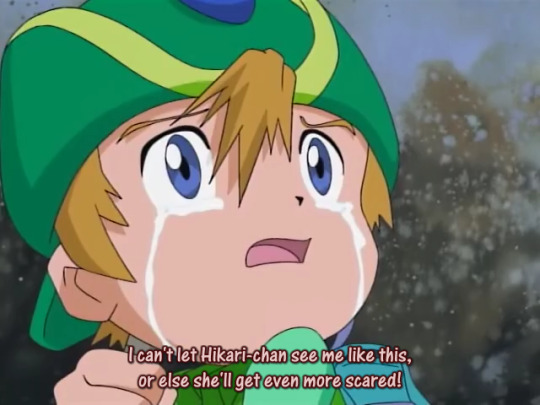
Adventure episode 52 is basically a major test for Takeru as to whether he really can hold himself together in a situation where everyone else older than him is gone, and “having himself together” is something he has to actually do instead of just have the surface facade of. He does, ultimately, pass, and this is why the Crest of Hope glows this episode -- but it’s also made clear that it wasn’t quite as easy for him as he would normally pretend it is. Of course, it also helps that Piemon is genuinely the scariest threat they’d faced during that time, but it also reveals that, yeah, ultimately, Takeru is an eight-year-old child who still has to struggle to put on a brave face so that Hikari doesn’t get impacted by his own fear.
For all it’s worth, although we get a ton of depth into his background and mentality, Takeru does not actually change that much as a character over the course of Adventure. This incident is probably what changes him the most in terms of him gaining a more solid core, and he also learns to accept the inevitability of fighting after his stubborn refusal to engage in it all the way back in Adventure episode 12 -- but for the most part he still does remain a bit naive about the world at large, and, more importantly, his issue with trying to cover up his problems with a confident smile never really gets addressed. At most, he’s willing to admit his grief over being separated from Patamon in Adventure episode 54, but even that is something Takeru tries to bounce back from quickly, much like with the first time he cried with Patamon in Adventure episode 12. But there’s nothing to indicate that his problem with emotional management isn’t going to continue being a problem from here on out if left unchecked.
That problem ends up taking another three more years to get addressed.
Takeru in 02
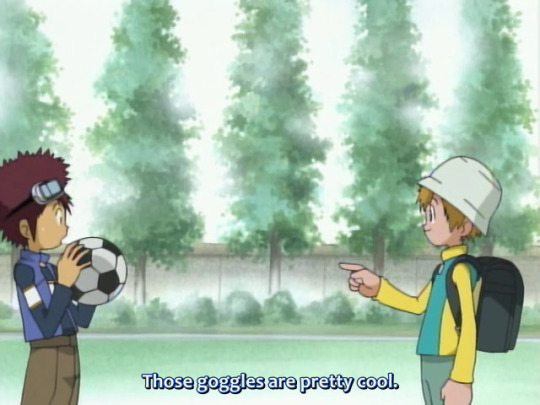

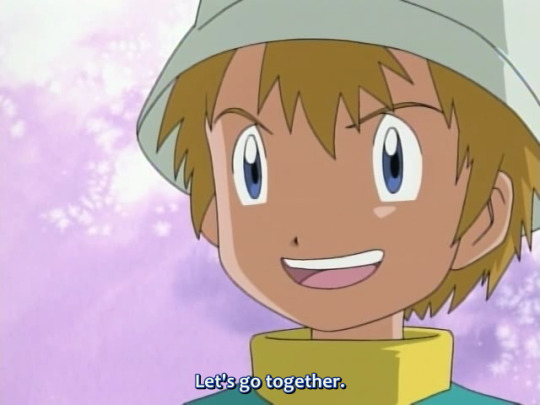
Takeru is one of the first people we meet in 02 (for reasons that end up revealed in the final episode), and right off the bat we learn that he’s a bit...evasive. He leaves a cryptic line to Daisuke about his goggles without coming even close to what we all know is the full extent of what’s on his mind (that the goggles specifically remind him of someone important to him), and later just...deflects Daisuke throwing accusations at him with a mild dismissal. In fact, even though Takeru pretty clearly understands very quickly what’s going on with Daisuke and how touchy he gets with the Hikari issue, he keeps dodging the question and constantly saying things that are evasive about it and therefore never truly helps his case until episode 17, when the circumstances between why Hikari and Takeru knew each other are finally properly clarified to Daisuke and he stops getting on their case about it on his own.
There were multiple points in time before this -- especially in episode 7, when Daisuke is practically at his worst in regards to approaching Takeru -- when Takeru could have easily said something to at least attempt to get Daisuke to stop bothering him, but Takeru never even asks him to cut it out! He simply continues to handle everything with a “yeah, okay, sure! :)” attitude, which of course confuses Daisuke (who’s rather allergic to people not being straightforward) rather thoroughly, and you wonder if he’s practically enjoying seeing Daisuke’s antics to the point he’s just enabling it further.
As a point of aside trivia, the official 02 website adds the fun detail that apparently he's popular with the girls at school but doesn't show much interest in them himself, and the Animedia audio commentary CD for Armor Evolution to the Unknown had his voice actor even express the opinion that he saw Takeru as someone who wasn’t really the type to think about romance at this age (adding in a separate interview for the 02 DVDs that he felt Takeru was respectful of girls primarily due to having been taught by his single mother to be such). The latter part of course isn’t something that comes from the writing, but given the website trivia I’m inclined to personally agree with it -- and, more importantly, the implication is that Takeru is at least aware of these kinds of things, but actively chooses to not think about it and deal with it when the time comes.
So in other words: That part about how Takeru actively suppresses things that are negative or inconvenient to think about, all for the sake of keeping a smile plastered on his face? Yup, still there.
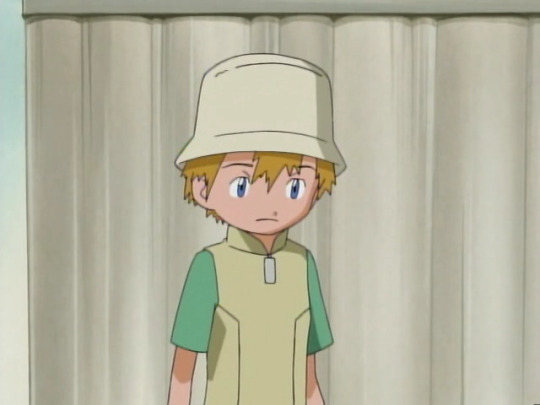

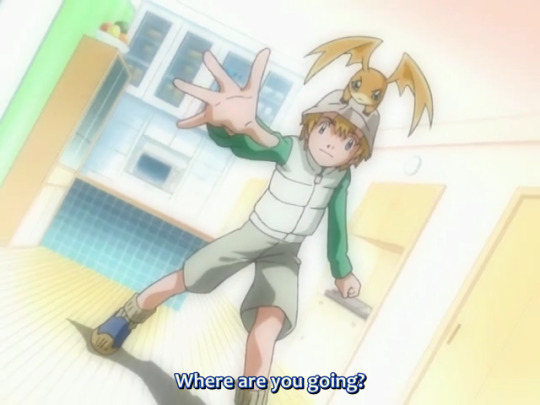
In fact, a blink-and-you’ll-miss-it moment from 02 episode 17 implies heavily that, even with their parents having developed a more cordial relationship after the events of Adventure, Takeru is now emotionally dealing with the aftermath of his parents’ divorce worse than Yamato is, since Yamato is at least able to speak about it casually and even joke about it openly, whereas Takeru keeps his mouth shut and the framing of the shot heavily implies he’s still extremely sensitive and unable to vocalize his feelings on it. Takeru never brings this up as something eating away at him for the entire series -- but BelialVamdemon uses it against him in episode 49, revealing that, yes, this is a problem that’s still tearing away at him, and yet he’s refusing to be open to anyone about it, even to Yamato himself. (Especially since, again, Yamato seems to be doing a great job trying to move forward; why kill his mood and thus be a “burden” to him?)

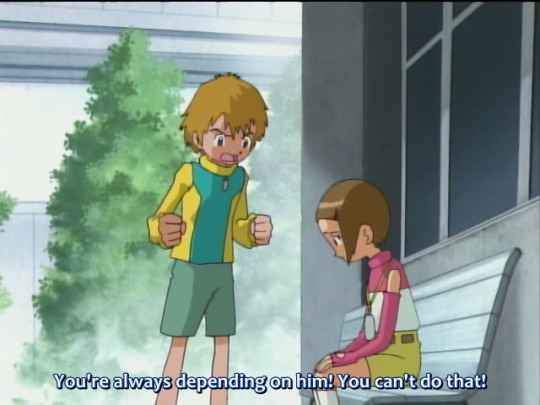
Even so, Takeru is very different in 02 partially because his circumstances are completely different. Adventure had him as the youngest in a group of older kids, so in terms of “being a responsible child”, that naturally meant being deferential and polite to everyone due to standards of propriety. 02 is where we learn a lot more about how Takeru interacts with peers his own age and people who are outright younger than him, when he has a bit more leeway to be more assertive.
On top of that, back in Adventure, Takeru was a young child who had a very small “range of periphery” -- as a young child still rather naive about the world, his emotional investment in things primarily pertained to loved ones and the people around him. But now that he’s a bit older, he’s gained a certain degree of strong feelings about “what’s the right thing to do”, and now has very strong opinions on it.
These things ultimately manifest in, unfortunately, Takeru losing his composure much more often than he did in Adventure, and for reasons that pertain to much wider things than just his brother. Still not having recovered from the trauma of losing Patamon back in Adventure episode 13, Takeru starts physically fighting Daisuke in 02 episode 11 because he perceives Daisuke as not doing enough to prevent Patamon from potentially becoming a slave to the Kaiser, and in 02 episode 13 he lashes out at Hikari in frustration about her refusal to do anything about her situation (which he of course ends up deeply regretting later in the episode).


Takeru’s infamous scene of suddenly switching modes on the Kaiser and punching him out in 02 episode 19 is basically the pinnacle of this -- because, yes, the Kaiser really did deserve it, but this really is not a good thing for Takeru either. This is Takeru getting the closest we ever see him to being a genuine sadist, and it’s basically everything to do with his emotional stuntedness coming out at once -- blowing up in anger out of nowhere with a passive-aggressive demeanor, succumbing to the weight of his trauma in the worst way possible, and mixing the ^^ front he puts on with his tendency to blow up angrily at anything that cuts him a little too emotionally close.

And for the first time, we see someone actually acknowledge how bad this is. Iori, one of the most consciously perceptive of the group, witnesses, for himself, the sheer jarringness of Takeru seeming to only really have two modes between “all smiles” and “unreasonably angry”. Sure, Takeru had shown a penchant for getting active as soon as there was something he needed to protect, but the moment it got personal, Takeru suddenly blew up in front of his eyes and almost turned into a completely different person. (Perhaps he’s not that different from Yamato after all...)
This is a very important moment because it sets up the base for what ultimately becomes the Jogress arc between Iori and Takeru. Daisuke ended up reaching out to Ken because Ken was someone who needed someone to accept him and teach him to move forward instead of drowning in the past; Miyako ended up reaching out to Hikari because Hikari knew herself to have a suppression problem but had difficulty doing anything about it, so the extremely in-your-face and aggressive Miyako could go in deep. But with Takeru, since his personality is genuinely volatile, and because Takeru goes out of his way to hide the fact he’s having emotional problems, personalities like Daisuke and Miyako wouldn’t help much because they’re too straightforward for someone like this who’s a bit unpredictable -- whereas Iori, who’s assertive but also methodical and thinks through everything consciously, is eventually much better able to reach out to him.
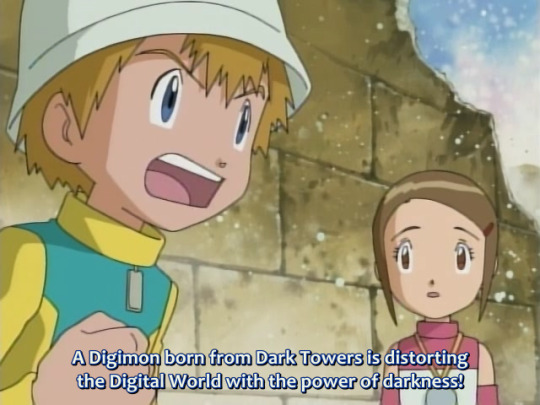
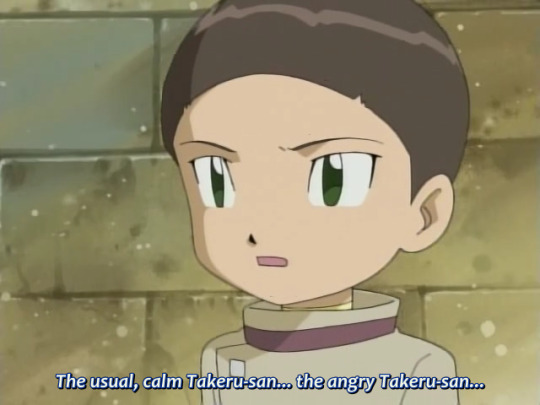
Once the relevant arc kicks in, in 02 episode 34, Iori continues to observe Takeru, and quietly notes the many “contradictions” in Takeru’s behavior -- since, after all, Takeru starts to sometimes violate what you’d think would be common sense whenever he gets too emotionally compromised. The fact that ostensibly one of the outwardly “nicest” kids in this group suddenly blows up in certain circumstances and basically goes “absolutely nope, needs to be killed!” in the midst of a few moral debates over killing sentient Digimon disturbs him deeply, and really, it’s not even about the killing part (after all, it’s later established in 02 episode 43 and after that Takeru and Hikari have a certain degree of acceptance of the inevitability that the others don’t) as much as Takeru’s being pretty gung-ho about it. Not “I don’t like it, but we have to” like he said earlier, but NOPE, GOTTA DO IT.
Iori refers directly to the duality of Takeru that he doesn’t quite understand multiple times in this episode (including in regards to the incident back in 02 episode 19), and it continues to torment him until the end, when Takeru only gives a very cryptic “clarification” that he doesn’t necessarily hate the darkness per se.

Iori, too intimidated to ask Takeru about it directly, goes to ask Yamato in 02 episode 35, and Yamato finally clarifies the background that we as the audience knew but Iori didn't: the story behind Takeru's trauma regarding the loss of Angemon back in Adventure episode 13. Yamato also makes a conjecture about why Takeru has been acting so ambivalent towards Ken -- you'd think he'd still be under Takeru's scorn after the events of 02 episode 19, but in fact Takeru's judgment of him in episode 25 was simply that he was certain something had changed, yet he couldn't tell what he was thinking (really rich coming from someone who refuses to tell anyone else what he's thinking himself!). Yamato guesses that Takeru is inclined to be a bit more forgiving of Ken due to understanding the feeling of losing a partner -- and the ultimate conclusion here is, basically, that Takeru's behavior is contradictory because he's acting based on what's personal to him, not necessarily via principles that make sense. After all, back in Adventure, it was clearly demonstrated that Takeru isn’t exactly rational when things hit too close to home.
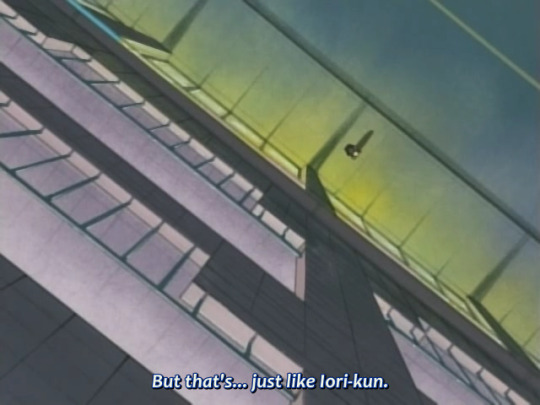

The other important thing that happens this episode is that Takeru learns that Iori is actively trying to reach out to him, when Yamato drops him a line informing him that Iori asked. Despite complaining that Iori could have just asked him directly, after Takeru witnesses the face-off between Iori and BlackWarGreymon and a demonstration that Iori is clearly trying his best to make sense out of this entire mess, Takeru actively reaches out to Iori and says something to comfort him -- “a life is beautiful simply by existing.” It’s still cryptic as hell, but it’s not something he would have said in the midst of his anger in prior episodes.
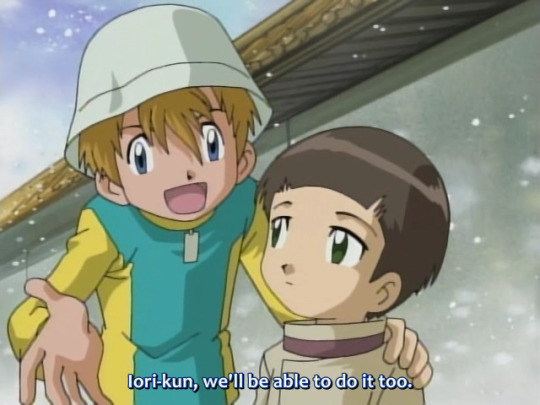

It would be one thing if it were simply that by itself, but the following episodes further push the idea that Takeru really is starting to change after witnessing all of this. 02 episode 36 has him explicitly acknowledge what Iori’s been doing this whole time in trying to understand him for the sake of their Jogress, and, finally, during their meal later that episode, he says, very openly and honestly, that he thinks they’ll be able to do it now. After two instances of Jogress, these kids are very aware of what that entails -- so this is basically Takeru consciously acknowledging to Iori “yes, I understand that you’re trying to reach out to me, and I accept it and want to understand you.” Because Takeru is such a convoluted sort of person, this “understanding” ended up being something that didn’t span a single magical moment as much as it took several episodes and a diplomatic, conscious affirmation on both ends -- but it’s a fitting way to go for someone who had always indicated some pretty poor conscious awareness of where his feelings were taking him.
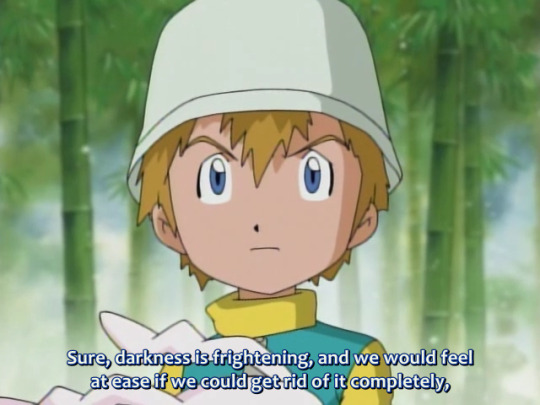

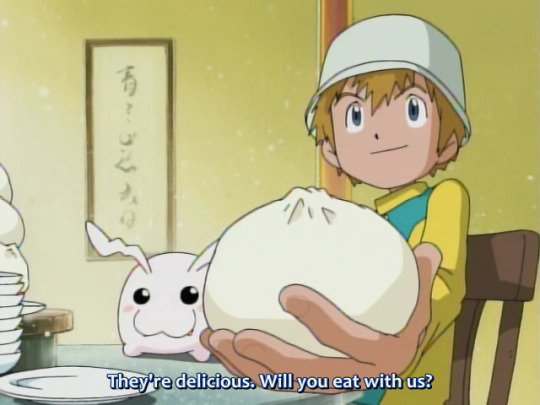
This is especially because, in 02 episode 37, his statements to comfort Ken are in pretty significant opposition to the sort of anger he’d displayed in earlier episodes, and are now a more pragmatic view of the issue in light of Iori’s efforts and everything he’d just witnessed with BlackWarGreymon -- and to drive the point home, the episode has, at the very end of it, Takeru making his first true explicit show of goodwill towards Ken after having been a bit touchy with him for so many episodes.
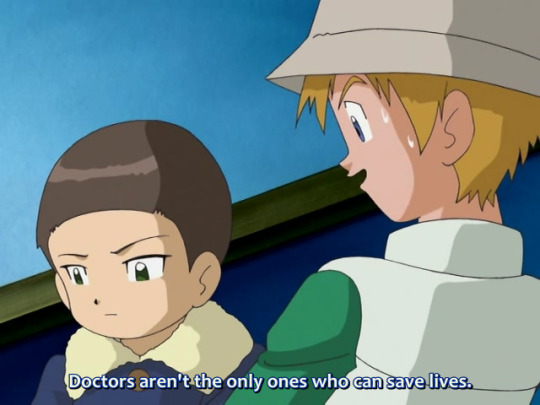
Iori himself, being the youngest of the 02 group, still has a lot to learn, and so Takeru, who had previously been one of the youngest in the Adventure group himself, now has his role inverted to effectively be a guiding mentor to Iori as he finds his own way. Basically, Takeru becomes responsible for the welfare of this young child, and so his way of treating Iori is markedly different from the more detached and playful way he would treat others from here on out. This is especially because, earlier, Yamato had informed him that Iori had taken a very roundabout way to help understand him better, and so Takeru probably understands that he scared the hell out of Iori earlier and needs to do better. While the Takeru of 02 episodes 38-50 still has a way of being playful, and while he still isn’t completely straightforward about his intentions, he is definitely much better about being open with the others, especially Iori, instead of doubling down on his “everything-is-fine” mode.
And perhaps this is what the other meaning of “hope” thus became in this situation -- learning to be forward-facing even in the midst of truly knowing and understanding everything that’s wrong with the situation.
Post-02
Although Takeru’s Spring 2003 track is addressed to no one in particular, meaning that it’s the most likely reason he’s so willing to be open about it, Takeru outright admits he’s having problems with his emotions -- especially those pertaining to Angemon’s death. We do, however, learn that Takeru’s started writing the early, early drafts of what’ll eventually end up becoming the novels he writes as a future career.
This being only a year after the events of 02, Takeru’s position is interesting. His decision to start writing is that he wants to have a record of everything before it’s forgotten -- because these things are very personal to him -- but he’s not emotionally ready for the huge task of finalizing everything in words, to the point he still hasn’t told his mother he’s started writing yet. After all, this is a book we eventually find out takes upwards of twenty years, and so this is the presumable reason why -- being able to get this down in a rational way that’s not emotionally compromising is going to be an upwards battle for him.

Even come Kizuna, there’s still a long way for him to go, because an actual line (in a very fast-paced movie) is dedicated to establishing that he’s still uncomfortable with his novel progress to the point he won’t even let Yamato see it. His official character profile and background details are revealing, too -- although he’s currently taking language classes in university and is even part of a children’s literature club, he still hasn’t actually decided on what to do with his future, meaning that he hasn’t determined that he’s going to be a full-time novelist with these yet. That means that even though he’s clearly still clacking away at his novel (multiple indications in the movie are given as such), his memoirs are still at the level of being so deeply personal, and not something he feels comfortable telling well, just yet.
I’ve pointed out before that despite not appearing directly with them in the movie, Takeru and Hikari have more in common with the others in the 02 group than they do with their Adventure seniors, and this is fully codified in the drama CD when Takeru is content to basically just “do whatever” with the rest of his friends instead of having any particular concerns about his future. And as someone who has a tendency to kind of just let his emotions take him wherever they’re going, this isn’t too surprising. Although he approximates as the closest to level-headed during most of the group’s antics during the CD, he’s still completely guilty of enabling them full-force, after all...
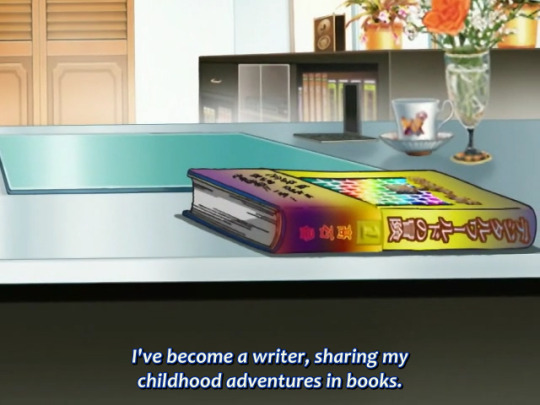
So, with the 02 epilogue, we get the massive meta reveal that the entire series was Takeru’s novels the whole time. This was planned to be the ending for Adventure before recording for the first episode had even started, but was postponed to the end of 02 when the second series was greenlit -- and if you’d followed the Japanese version, there are a ton of meta hints scattered around from day one:
The narrator of the series is Hirata Hiroaki, who played Takeru and Yamato’s father, and is revealed in this episode to voice him as an adult as well;
Episode 12 of Adventure is named “Adventure! Patamon and Me” and is the only episode title in Adventure or 02 to use a first-person pronoun -- and it’s of course a Takeru-centric episode, with the episode title using Takeru’s boku;
02′s first episode kicks off narrated by young Takeru opening the story, with Takeru himself suspiciously omitted from the opening vignettes;
02 episode 18 suddenly has the narration cut in when discussing Takeru’s trauma from Adventure episode 13, with the younger Takeru even filling in part of it himself;
02 episode 49′s “next episode” preview for 50 suddenly also starts using “we”, which also includes Takeru’s boku;
Finally, Takeru starts narrating right after Oikawa’s death, which fades into what’s revealed to be his adult voice.
In the context of Adventure, Takeru was “the youngest child”, so the idea makes sense that “the littlest one” would be the one to grow up and reflect on all of the adventures they had as kids -- and once 02 was added, it practically made sense that Takeru would be the one to recap both adventures, being the one person who was there to completely witness both (it also explains why Takeru and Hikari’s character arcs remain somewhat unresolved by the end of Adventure compared to others, since by this time it was apparent their story would be continued in the second series). So on a meta level, Takeru is, in a certain way, one of the most important characters in both groups.
On a level relevant to his personal character arc, on the other hand, the point here is that Takeru finally managed to put together his book and story in a way that he was comfortable telling the entire world about, to the point of choosing to make his entire career into it. That’s something that requires a lot of coming to terms with what happened, how he feels about it, how others feel about it, and everything about the whole ordeal in general, without compromise or (too much) bias.
And in the end, that’s really a lot!
295 notes
·
View notes
Text
On the Legendary Wolves’ Plot in Pokéspe SWSH
I really like the way the legendary wolves’ plot is being handled in Pokespe so far. They’ve made a handful of changes and additions to the plot as it’s presented in the games that make it feel integral to the main characters and the overarching story, as well as just being more interesting to follow.
Part of the reason why this plotline is weak in the games is because it’s presented as just a minor subplot. You occasionally get more information about what really happened as you progress through the game, but it doesn’t seem important for you to pay attention to it until you get to the climax and Rose reveals that he’s caused the Darkest Day. Even though you encounter Zacian or Zamazenta in the Slumbering Weald at the beginning of the game, it’s not until Circhester that Hop connects that encounter to the legend you’re unraveling. And in the grand scheme of things, all that encounter does is confirm that the sword and shield Pokémon live in the Slumbering Weald - which Sonia apparently also learns about in a book that mentions Zacian and Zamazenta by name. So, why was it necessary, again?
But right out of the gate, Spe immediately ties the legendary wolves into the main characters’ backstory and motivations. A year prior to the beginning of the chapter, Sou goes to the Slumbering Weald to try to find the Rusted Sword and Rusted Shield. He knows about them – and has an interest in them – because he’s from a family of swordsmiths, and he wants to see genuine, historical pieces of armor in person. Meanwhile, Schilly goes to the Weald to look for a Wishing Star that she had seen falling, since she wants to get it made into a Dynamax Band. The pair encounter the illusory Zacian and Zamazenta, and Sou immediately comes to the conclusion that these two are here to protect the Rusted Sword and Rusted Shield – a conclusion supported by the fact that when they walk through the illusions to try to take a look at the artifacts, they’re knocked out by a flash of light. When they awaken, the Rusted Sword and Rusted Shield are gone - as are all of Schilly’s Pokémon. Sou decides to start traveling with Schilly because he feels partly responsible for her Pokémon going missing, and Schilly decides to compete in the Gym Challenge to spread the word about her missing Pokémon and make it easier for her to find them. Additionally, it’s later revealed that Sou decided to participate in the Gym Challenge so he can get stronger and challenge Zacian and Zamazenta to a battle, believing that they’ll only allow someone with skill as a Trainer and an earnest desire to see the Rusted Sword and Rusted Shield to see the artifacts in person.
So, in short, the reason why Sou and Schilly met and their respective reasons for taking on the Gym Challenge are both intrinsically linked to their encounter with the legendary wolves. This makes the wolves’ presence relevant throughout the whole story, ensuring that the reader doesn’t forget about the encounter by the time it becomes relevant again. (I also appreciate that they gave the wolves a concrete reason to appear before the protags in the Weald, something which the games and anime never really bothered to provide.)
Additionally, the decision to introduce the Rusted Sword and Rusted Shield right away instead of saving their introduction for the climax like what happens in the games was a really smart choice. First, it ties directly into Sou’s interests, giving him a good reason to be interested in the Rusted Sword and Rusted Shield as well as the other legends involving swords and shields. Second, it allows the characters to link together the encounter with Zacian and Zamazenta to the information they’re learning about the legends - Sou observes that the sword and shield held by the statue of the hero in Motostoke as well as the sword and shield depicted on the Hammerlocke tapestries resemble the Rusted Sword and Rusted Shield, suggesting that the legends have a connection to the artifacts. And when I say “suggesting”, I don’t just mean in the sense that it’s something you can interpolate from the text. I mean that Sou literally says, “It’s not entirely unlikely that the three are all the same,” and Raihan brings up later that if they’re the same sword and shield, the legendary wolves may be connected to these events in some way as well.
This is another thing that I really appreciate about the way that Pokéspe is handling this plotline: the characters actually speculate, hypothesize, and draw conclusions about the evidence that they’re being presented with. In the games, most of the encounters with Sonia just involve you pointing out incredibly obvious things about the historical artifact/legend, and Sonia agreeing that they’re significant. She asks a lot of questions, but doesn’t postulate answers to them unless they’re directly being shown to you. And even some of the conclusions she draws seem like leaps of logic, like when she assumes that the statue behind the Stow-on-Side mural must be correct because it was made in “truly ancient times” - like, we just discovered this statue, Sonia. We have no idea how old it is.
But in Spe, the characters draw logical conclusions from the information they have, which means they can figure things out a lot faster than they do in the games and makes the conversation interesting to read whenever they learn new information. For example, Sou speculates that the sword and shield wielded by the hero might’ve had special powers, which is true. How did he figure this out? He explains that he thought about it because the hero used them to fight giant, rampaging Pokémon, which is a bit difficult to accomplish with a normal sword and shield.
Another great example of this is in Hammerlocke vault, when Sou guesses that Chairman Rose wants to cause the Darkest Day. One might think that he’s figuring things out way too quickly, but the thing is, this conclusion makes perfect sense given the information he has. While looking at the tapestries, Sou notices that the first one depicts a Wishing Star falling and the second one depicts the Darkest Day occurring. Thus, he guesses that Wishing Stars might have caused the Darkest Day, a hypothesis that Sonia agrees with because they’ve already figured out that the Darkest Day has a connection to Dynamaxing, and Wishing Stars cause Dynamaxing. But Sou had previously learned from Bede that Chairman Rose is collecting a massive amount of Wishing Stars, so it’s only natural that his next thought would be to wonder if Chairman Rose is - advertently or inadvertently - going to cause the Darkest Day again. This immediately ties the Rose plot in with the legendary wolves’ plot, a connection that doesn’t start to be made until your third visit to Hammerlocke in the games.
In general, the Hammerlocke vault scene is way better in Spe than it is in the games, where all you get is Sonia saying that the disaster depicted is probably the Darkest Day and wondering if there was one hero or two. Besides the conclusions that I already mentioned, Sonia also connects the disaster shown in the tapestries to the disaster shown in the Turffield geoglyph, concluding that they’re both depictions of the Darkest Day. However, Sou points out the lack of giant Pokémon in the tapestries, which are always associated with the Darkest Day. I really like how they point out both the similarities and the differing details between the stories, which makes it a little more understandable why no one has ever put together that this myth of the creation of Galar and the legend of the Darkest Day might be referring to the same event.
Finally, the last major improvement that I want to talk about is the one that was introduced in the latest chapter: an explanation for why the legendary wolves’ existence was lost from the legends. The destruction of the Stow-on-Side mural happens offscreen in this story, which is kind of understandable - the main significance of this statue in the games was to introduce the concept of Pokémon being involved in the legend, which Sou, Sonia, and Raihan had already figured out. This statue holds a completely different significance here: when Sonia is telling the protagonists about the newly discovered ruins, she says that she thinks the mural was put up by someone who wanted to deliberately hide the two Pokémon from the legend, giving all the credit to the humans. She points out the tapestry at Bob’s Your Uncle as further proof of this, which - given its condition - looks like someone threw it away so it would disappear from history.
I don’t believe that the games ever explain how the tapestry ended up in the restaurant, so the fact that it’s given any sort of context here is really neat. But more importantly than that, it’s really interesting that they’re stating outright that the legendary wolves were deliberately removed from the legend. In the games, Sonia wonders why the ruins at Stow-on-Side would be hidden, but doesn’t offer an explanation - she doesn’t even say anything to suggest that it was done intentionally. The question is never brought up again. So I’m really hoping that Spe won’t go that route, and this revelation will have broader implications in the story next chapter or even later - that we’re going to find out who covered it up, or possibly that someone in the present day knows about the cover-up and is willingly propagating it. The immediate assumption is that it’ll be connected to Sordward and Shielbert in some way, since they benefit from the legend being that their ancestors were the heroes who saved Galar. But I think it could also be interesting if we find out that Rose knew about the statue and is deliberately trying to keep the existence of the sword and shield Pokémon covered up - it’d make a lot of sense why he was so unforgiving to Bede for trying to destroy the mural if that were true. Either way, I’m excited to see where they take this concept.
tl;dr The way Pokéspe has been handling the plot points related to the legendary wolves has been really good so far, much better than it was in the games, and I’m very excited to see how it develops going forward!
#pokespe#pokemon special#swsh chapter#analysis#trainer sonia#trainer sou#trainer soudo#zacian#zamazenta#i spent way too long on this#please read and appreciate it#also it has given me a much greater appreciation for sou as a character#he's at his best when history is involved tbh
115 notes
·
View notes
Note
why does jean warn up to mc so quickly? ikevamp makes it clear that jean is a pretty reserved person and doesn't open up or let people in easily but he seems to let mc in quite quickly and it confuses me quite a bit.
Oh boy, where to begin with this one.
Well, I have a lot of Feelings^TM about this, but I'll try to be concise. Essentially, I think Jeanne doesn't recover in the other routes--or the general storyline--largely because he's just a lot to unpack narratively speaking. And without some pretty direct intervention, he has a hard time healing. MC’s direct intervention was meaningful because it was focused, consistent, and adapted to Jeanne’s specific needs. She also doesn’t make light of his experiences which is key; she fully understands that she can’t fathom what he’s been through. There is a very weighty respect and acknowledgement, a seriousness with which she treats his wounds that’s important.
It’s easy to make this a “why is MC nOt LiKe ThE oThEr GiRlS” but honestly that’s just not the sense I get when I look at all the information available to us.
That being said, I also just feel like every person's recovery from traumatic events doesn't really look the same? I mean Leonardo’s cptsd isn’t going to operate the same way Jeanne’s wartime/Inquisition cptsd is going to operate. Some people require very individualized healing, others will often require a large scale group effort to lift them up.
Typically people don't ever just get over what happened to them and never worry about it again, either. It's usually a process of coping; the hope is that with time you find healthy ways to deal with grief and move forward. Therapists aren't magicians, they just help people process painful experiences/thoughts. It's honestly up to individuals to find meaningful ways to implement these tactics.
Tl; dr: My contention is that Jeanne doesn’t open up or choose to stay alive because MC magically heals him, rather his recovery is a convergence of many people’s efforts and hopes that he stays alive. Gilles (he insists that Jeanne must live, asks him to promise), MC (affirms and bolsters that promise), Comte (makes a second life and recovery possible)--and in no small measure Mozart and Napoleon--all make an active effort to buoy him. As people often say, it takes a village to raise a child.
While Jeanne seems to respond most powerfully to MC’s attempts, it feels more like a product of chemistry/compatibility than it does a random cop out. There is no insinuation that only romantic love can heal; after all, MC gets close to him without any romantic intentions at first. They’re just good friends? It’s more that their feelings simply moved in a different direction after a point, which doesn’t necessarily happen all the time. Jeanne is also incredibly moved by Mozart’s love for him as a friend, Comte’s love for him as a father, and even Gilles’ love as a comrade to an extent. If anything, without their input Jeanne’s capacity for romantic love would be questionable at best.
Now, because I can never for the life of me stop analyzing, I have a more large scale outline of my thoughts below. Spoilers for Jeanne’s route:
If we look at Jeanne's life history, he has pretty specific trauma. Most of the harm he endured was a direct result of human rights violations after the war itself. He didn't enjoy fighting and killing people, but he's also very much a man that sees the reality of his position: it's either kill or be killed. His entire goal was to defeat the enemy as efficiently as possible in the hopes of ending conflict, and with his enormous resolve turns the tide. He had no innate interest in inflicting harm, or lack of control when engaging. He isn't pathological about it, and doesn’t dehumanize the other side. He was more "this was an act of necessity, but those are still human beings." So as far as I can tell he has a very strong moral compass and sense of duty, he doesn't show much delusion/confusion in that regard. (Also evident in his conversations with the young orphan boy.) Furthermore, he has been shown to have a sense of humor--cracking jokes with Gilles and boosting morale for his fellow soldiers.
His childhood abandonment is significant (he left his home because he was "not an adequate farmhand and they had no ability to feed all their children") but I don't know if I would consider it a huge trauma point for him. It seems as though he deemed it an act of necessity--not spite. It was simply the way of things, and he couldn't help his wiry constitution. You'd be surprised how common that was once upon a time, tbh... While it's certainly not right or fair, it does appear that in his perception it was the choice he made and he moved on after he became a soldier. Just focusing on what he could do, rather than everything he lacked. For people in his position, they often feel it is useless to linger on what should have been. There’s no time to linger or doubt, life hangs in the balance.
That leaves us with his time under the Inquisition, just before he was slated to be burned alive. I think this is the keystone trauma point for him, because there are a lot of moving parts to his powerlessness here. The first part is that his entire life's mission--ending the war so that people would no longer have to die and/or starve as a result of senseless violence--was just sabotaged. All those years of doing things he never wanted to do (wartime violence) and being forced to leave his family to ensure they didn't all starve, all of it treated like some kind of joke. Like he didn't sacrifice years of his life and sanity to protect a people who were happy to call him a monster and watch him burn alive. The second part is the overt gaslighting and rewriting of Jeanne's personal history (and overall French public perception) for the sake of the King's political agenda. To call him a treasonous danger to the country when he was once lauded a hero. The third portion is the actual physical helplessness of being arrested, starved, and continuously maimed for no reason beyond pure malice. While it's never right to do that to any human being, this was done to a man who prided himself on his stalwart moral code. To abuse and torture him for something egregious that he would never do (at the risk of death) is just another slap in the face to everything he is and believes in.
I just feel like the context clarifies why that period of time would be the tipping point. His entire moral code and life’s work is being called into question and swept aside, as well as his agency? He believes very powerfully in a sense of right vs wrong, what's fair and what isn't fair. Somebody else deciding that for him--and deciding in a way that is openly unfair/incorrect--further makes him lose himself and his sense of reality. A person in that situation begins to doubt if they are good or bad. His belief in god all the more pressing; if he was a good person, why would fate bring him so much suffering? Honorable soldier or not, his blade has drawn so much blood...
People often reference his stilted social skills (and I am of the belief that he is on the autistic spectrum) as a reason why he is so "people-adverse" but tbh? I don't agree. His memories before the onset of this trauma reveal that he was actually a very warm person, and that people were more than willing to fight under his banner. He had friends, and he had comrades--his country loved him. He was the picture of well-meaning civic duty. Just because he doesn’t integrate smoothly into larger social groups or adapt well to socially shifting circumstances, doesn’t mean he just hates people lmao. When people give him the space to exist within his comfort zone and don’t take advantage of him, he thrives. Compounded by that, we also have his actions in the present to further prove what is true and what isn't.
While he is stern with the orphan boy (I'm sorry I can't remember his name, damn it) there is no malice or cruelty in what he has to say. He doesn't punish the kid or do anything out of line. It may not be fair in terms of the adult level of discretion he asks of him, but the kid also didn't have a lot of options realistically speaking lmao. Same thing with MC, she and the orphan boy are nearly identical in how Jeanne treats them. He's a little rough, but the route reveals that his intentions are just a reflection of what he's been through. He truly believes that if a person isn't strong, they won't survive--because his entire life was a series of trying to be strong/reliable because nobody else would. There was nobody to protect him, and nobody to care for him went things went south. It was him and his sword against the world, and even his exceptional skill as a fighter did not protect him from the Inquisition's arbitrary torture. He has lived in a world where good acts can become absolutely meaningless, where following rules and helping people still gets you slaughtered. That's going to take a considerable toll on his mental health: where do you find the will to go on when the next second of your life could mean the devastation of everything that matters to you?
Spoilers: you don't. Or if you do, every minute of the day is a fight to stay alive. That is the point at which we meet Jeanne. Caught in the hellish whirlpool of wanting more, wanting better--but being terrified of the cost. The cost of hoping, only for his entire world to go up in flames again. It's not a small thing, in my view.
If you have any doubts as to whether or not that is the case, I direct you to literally every singular instance in which Jeanne's emotional sensibility goes visibly dark/south. When do these instances happen? When it rains, for one. And when Shakespeare deliberately starts pressing on his sensitivities: about the soldiers he was forced to kill, about the nation that spurned him, how he's truly "wicked" at heart and doesn't deserve to be happy--seconds before flames erupt for the festival. Does that really sound coincidental? I mean lmao. The rain is a painful reminder, but MC transforms that memory into something a little lighter with her bet. He has nothing to lose in her game, all she does is ask for time with him or offers him something if she loses. There's a playfulness there, a restoration of agency and ease that's invaluable to his recovery.
As for Shakespeare's deliberate retraumatization...I can't even begin to explain how damaging that event was. Shakespeare is undermining Jeanne's agency in that he--not unlike the corrupt monarch of Jeanne's era--is twisting Jeanne's beliefs to work against him. He knows full well that Jeanne doesn't feel like he deserves somebody so bright and understanding (we need to remember it's not really a luxury he's had much in life, especially after the war ended). He knows Jeanne has a tendency to impose that strict moral code on himself even more than he does on others. To reaffirm his every worst fear and lurking terror only throws Jeanne into a vicious downspiral. Jeanne doesn't reject MC out of disgust or hate. He rejects her because he literally cannot handle the concept of trying to be happy again, or of burdening her with his constant struggle to move on while he’s in the middle of a bad episode. He knows he won’t be able to stop reliving the past, that every second of his life and breath will be colored by his gruesome memories. He's trying as hard as he can to keep the intrusive thoughts quiet, to move on. But I'm not going to lie to any of you, that is incredibly difficult to do alone.
The next obvious question is, well why can't the other men help him? This isn't to say that they can't--we see how much solace Jeanne finds in Napoleon and Mozart. Even Isaac is gentle with the veteran. But there are limits to how much they can do. Napoleon is struggling with his own wartime trauma, and it's not identical to Jeanne's. Plus there’s a distinct difference in their sensibilities? Napoleon is the type to habitually seek comfort in helping others when he can't help himself, he's not as in tune with answering his own personal feelings and regulating them. (I mean just look at his new ES: he knows what he wants, but it takes a nudge from Isaac for him to go through with it.) He’s very communally reliant in ways Jeanne isn’t; Jeanne is a very private person, and typically prefers one on one from what I can tell.
Mozart is the definition of repression, and if you look at their interactions it's usually Jeanne that's smoothing over Mozart's rough edges. Mozart says as much himself: that he feels like a rotten friend because he knew Jeanne was struggling with a lot of intense trauma, but he didn't know how to unravel it without hurting him in the process. Mozart calls it personal cowardice, but honestly I just feel like they both had too much going on to be able to help each other effectively. (And Jeanne expresses this sentiment too? This idea that he's not angry with Mozart? He knows they're both carrying a lot, he's just touched Mozart cares about him in return.)
Okay, briefly unrelated, but like. Am I the only one that wheezes uncontrollably when Mozart is like "?????? Idk what it is about MC...I don't want her to be scared of me..." in his own main story in the baths. And Jeanne. IS TRYING SO HARD. NOT TO SPILL THE BEANS ABOUT HIM O B V I O U S L Y BEING IN LOVE. THE HILARITY I CAN'T DO THIS. Jeanne was like "yeah....yeah that's rough buddy.......[screams internally, give your boy time Jeanne he's fragile]"
Honestly? That's the thing about Jeanne too--he has incredible self-awareness and hyperarousal-related (I mean the PTSD kind, get your head out of the gutter) awareness to the people around him. He's very, very conscious of the fact that he is surrounded by geniuses when he can't even write his own name. Just because he has the fortitude not to lash out with his insecurities, doesn't mean he never feels stupid or inferior. And it doesn't help when there are people in the mansion who call him--a fucking war veteran from 500 YEARS AGO--nAiVe. He's not naive lmao. He just doesn't know how the world works so many years later, and it's a ridiculously steep learning curve? Leonardo and Comte are nearly 500 years old, but they lived throughout every hour of that time in a linear fashion. It is a big deal to be moved from 1430 to 1890 in the span of a second asynchronously, and then be expected to function without a hitch??? Given the circumstances he adapts well.
That atmosphere--this constant impatience with what he doesn’t understand, his inability to be caught up to speed quickly--is going to hinder his recovery lmao. He feels like a burden most of the time, and agency and freedom are crucial.
Another thing that occurs to me about the mansion's arrangement is that there is a power dynamic, just as any space with people in it has some level of hierarchy (unless you live with miraculously chill people). Jeanne is acutely aware that Comte is the most powerful being in that space, and he is not only hatefully angry at him--but likely afraid too. We have to remember that the biggest betrayal he witnessed in his life was at the hands of a monarch; it was the aristocracy that turned on him and erased the truth. Comte is openly a child that resulted from both that era and that type of lineage, I don't really blame Jeanne for being wary. He intimately knows how willing rich people are to throw normal folks under the bus to suit their ambitions/whims. Comte, while not deliberately threatening, also seems to be painfully aware of this impression he gives off. His "chad persona" as I've mentioned allows him to navigate his life in secret by necessity, but it’s actively damaging to his son. He can't reveal the truth because of Vlad's betrayal, and he's openly unsettled by what it could mean to be honest. Will they wonder about Vlad and find themselves ensnared under his mind control as Charles and Shakespeare are? Will Comte himself be subjected to the mortifying ordeal of being known only to lose them?? That's a risk he isn't willing to take--and that leaves him in a double bind.
What is it that they say, the truth will set you free? This is where MC and Comte come into enormous play when it comes to Jeanne's recovery. One thing to keep in mind is that most of the people in the mansion have their own traumas they're trying to carry, and I feel like a lot of them are unsure how to approach Jeanne. Or if they do, he's very guarded. It takes a lot of consistent effort to get through to him. What does MC do when Jeanne unleashes his harsh worldview on her? She's understandably frightened, but Jeanne isn't malicious (so she chases him around). In fact, he openly avoids and runs away from her--well aware that what he's done is wrong. If anything, he did it on purpose, bringing us right back to Shakespeare's verbal undoing; why does Jeanne attack her in the first place?
LMAO. He attacks her because she essentially says "oh thanks for helping me!" "I am not nice. Watch yourself." "But you seem like a nice guy to me?" "REEEEEE" Does the pattern become a little clearer? When people think kindly of him, his instinct is to shatter that illusion with an impulsive reprehensible act. When people think poorly of him or lash out, what does he do? When that orphan boy starts yelling and screaming, Jeanne is nothing but calm. He explains the situation, and offers the kid a choice, perfectly happy to be the bearer of bad news. This operates on many levels I’m sure, but I have a feeling it has something to do with him being hailed a saint and a war hero only to be tortured and branded a monstrosity (and he probably thinks being a vampire is doubly monstrous). He’s more comfortable being hated because he feels it’s what he deserves in a lot of ways.
Jeanne has a lot of internalized self-hatred because of what he's done, and because of how much harm was inflicted on him outside of his control (he's Catholic and he was tortured, come on this writes itself). If I'm honest, I think that's actually the greater part of why he hates Comte lmao. Comte refuses the very concept of being cruel no matter how much Jeanne lashes out. Sure he lectures him and scolds him, but he never actively limits what's important to him or controls or harms him. Comte fully realizes the tragedy of how Jeanne's life was used by a nation in dire straits, and knows he needs time and acceptance to heal. No matter how dismal or unhappy, Comte doesn't stop--he fully believes Jeanne should have time in his life where he can really live for himself for once. But therein lies the issue, Jeanne doesn't know how to live for himself.
Which brings me to how MC and Comte "heal" Jeanne. I feel like they give him the space he needs to recover, and that's what results in his gentled temperament and happiness. Remember that so much of his main story is MC endlessly chasing after Jeanne. No amounts of his hissing or running or threatening stops her. Even if his refusals are empty of real dislike, they're enough to deter most people. Not MC. She's able to see through to the depths of who he is, and doesn't just use him for her own ends? She actively seeks to teach him (to read and write) to help him settle better in this era, she actively tries to ease his distaste for rain with a well-meaning bet, and she never gives up on him. (Actions mean so much more to him than words in general too, tbh...). Love is more easily defined by work and effort than it is by attraction.
When he has his episode at the festival, sure she's rattled; but that's because she truly believed that he didn't want to be around her anymore. When she notices he really doesn’t want to be followed, she stops like any normal person would. It’s only when she reads his notebook and sees the truth for herself (that he’s given up despite having the same feelings for her) that her determination is rekindled. She doesn't approach him fearfully, doesn't treat him like he's made of glass either. She just wants him as he is--accepts and loves him as he is. Scarred, bloody, exhausted, abrasive, terrified. She doesn't define him by how easy he is to love. That is a huge issue with traumatized people lmao. Because of their maturity, people always just assume they don't need help, or they rely on them to an extent that isn't sustainable. The second they reveal need or that they struggle, people walk away or victim blame them because it’s easier than taking them seriously.
While MC's attempts may be a little more obvious (cherishing his lily field, wearing the hair pin he gave her, careful about his gruesome injury, really listens when he talks about the horrors of his life and accepts that he experienced a level of agony/terror she can never understand, tries to express her feelings no matter his evasion) I think it's also important to consider Comte's large scale effort. I don't say this to undermine MC, I say it because Jeanne's life was defined by a complete lack of security. He left his parents to make their lives easier, he lived in a war that meant life or death any second, and his country's leader branded him a traitor which lead to his endless torture and public execution. Jeanne does not know a life in which safety is the norm. Point blank. He does not understanding going outside and not expecting the worst anymore.
Comte not only understands that level of despair, but treats it with dignity and respect. He fully accepts being hated if it means Jeanne can use that hatred to live on and find a way to heal. And most importantly, when Jeanne begins to move forward with MC and Mozart's help, Comte never once holds it against Jeanne when the truth is revealed. He's not angry, this isn't about reprisal or reparations or revenge. It's just love.
Jeanne doesn't really have a concept of this? His entire life was mostly transactional, defined by strength and efficiency. Nobody gives a damn about your feelings. You either hurl yourself at the problem or die. Nobody is going to help you or carry you or save you. While he may have had a little more support while he was in the military from his fellow soldiers, that support system was ripped away from him during the Inquisition.
One very common sentiment regarding elongated imprisonment and torture is that survival occurs in pairs. It is an undeniable fact that people need others to survive. It is the nature of who we are. Individualism has never proven to be successful, or if it is, its dividends are astronomically minimal when compared to people working together.
What does it mean to be the most reliable, steady person in the room? Usually it just means you don't know how to ask for help when you are no longer capable of maintaining that stance. Napoleon is guilty of it. Leonardo, Comte, and Jeanne all are too. It's part of why MC and Comte's capacity to see what he needs and provide as much as they can is such a big deal. That sort of consistent support (without a constant necessity to beg for help) allows Jeanne to be able to re-integrate into his new reality and find joy. Even if his nightmares and memories never go away, they are now being actively overrun by positive experiences. That's the thing about recovery, really--it tends to be more about drowning out the negative as much as possible and coming to terms with it, than it is about forgetting or never feeling it again. It’s about softening the sharp edges of pain like sea glass.
So is MC magical and randomly got Jeanne to open up? Nah, I don't think so. I think it was a series of persistence and real acceptance of who he is that made him warm up. People really seem to underestimate how deeply affecting understanding is, but that's how damage is undone. Jeanne can't really linger on the idea of his own monstrousness, his unworthiness, a lifetime of misery, when the person in front of him actively listens and cares about him. Makes him laugh and smile and lose himself in warmth for the first time.
If I'm honest, I feel like people also just...underestimate the level of traumatic resurgence that's perpetuated and inflicted by society’s standards in general lmao. This rhetorical structure in which good and bad exist in moral extremes, this idea that people should be able to recover and never experience relapses or periods of sensitivity. The refusal to radically listen to people and their problems, and make active attempts--not matter how small--to mend/ease those hurt feelings. Granted there will always be people in the world who do not want to improve, but I feel like most people want to. It's hopelessness, silence, and stigmatization that remain the true enemies of traumatized/mentally ill people everywhere. And among that population are always war veterans...
#ikevamp#ikemen vampire#ikevamp jean#ikevamp jeanne#ikevamp meta#ikevamp saint germain#ikevamp comte#sorry i have a lot of feelings about this topic kjahsflkjhsjkghfd#but yes!#i think mc being able to help him was more about her sensibility and the mental fortitude/space to be able to care about him as he needed#i don't think it's necessarily that she's SpEcIaL#trauma is a sensitive subject--especially considering he's a war veteran#but i also think it's simple and complex at the same time#simple in the sense that people really do just need consistent support and love to be able to care for themselves again#complex in the sense that support can come in so many permutations and some of them are very delicate and multi-faceted#and thus must be handled with extreme caution in some regards#anywho not that i'm any kind of expert this is just what i understand and see#also in case it wasn't clear i love him and cry every day (look away comte it's my whoring hours)#though i hope this helps??? i went off harder than anticipated lakjhglkj#thank you for the ask!!! <3333#asks#rambles#not incorrect quotes
94 notes
·
View notes
Text
The Bone of Impurity
So with the upcoming Winner is King, my brain got whirling with the thought of The Bone of Impurity which is arguably one of the main plot points of the novel and I thought I would do a bit of a meta for it? It is definitely something I hope they do not dilute for the Live Action adaptation but even if they did touch upon 1% of the shit that goes on into making a Bone of Impurity, it's still pretty Dead Dove Don't Eat. So I thought I would preempt it by actually putting down a primer on the Bone of Impurity.
I did not read the novel in Chinese and read it in English, so some of the more subtle themes present in the original work will have been missed by me. If anyone who has read the Sha Po Lang novel as it was written by Priest, do let me know if I have made any mistakes on any of the below ( •̀ᄇ• ́)ﻭ✧
Fair warning, there's some pretty Nightmare Fuel inducing shit, so I'll be keeping things under a read more in case people get squicked by this lol I'm also basing my references around the translation that Northwest Flower did because that is the one I read.
Just a basic background on The Bone of Impurity:
It is essentially a curse unique to the Northern Man people who utilise it in moments where someone's country is broken and nothing remains but revenge. To attain that, they make a sacrifice to the 'evil' gods of their beliefs
It is a cruel and horrible affliction to put on the person, but the return for it is that the person who becomes a Bone of Impurity gains the strength, intelligence, foresight and abilities of two persons
Whoever becomes a Bone of Impurity is someone who is single-mindedly ruthless and bloodthirsty when pressed towards a goal; they will attain power and their near supernatural abilities will make them unstoppable in achieving their goals
They will also gain a sort of existence that is neither alive nor dead. Sort of a zombie-like living. They also don't live very long
For all this super abilities, the flip side for anyone living with the Bone of Impurity is that they will be constantly highly suspicious and paranoid of everyone and everything; they will be slowly driven mad by the visceral hallucinations that will leave them incapable of knowing what is real and what is fake (Volume 1, Chapter 26; Volume 3, Chapter 70)
A Bone of Impurity attack comes about when the afflicted experiences heightened emotions or moments of extreme stress (I seriously cannot list out all the times it popped up in the novel because we would be here quite long lol)
It manifests in dual pupils being observed in their blood-hued eyes, hypersensitivity of the senses, their body burning up, almost sleep paralysis levels of body-lockedness and they will experience extreme pain with the bouts of attacks lasting hours at a time (Volume 2, Chapter 50 & 51)
The method of 'refining' a Bone of Impurity is...
Basically taking two babies and putting them in a dark place with no air, no water, no food. One of the babies will survive while the other one dies (Volume 3, Chapter 70)
I'm not quite certain if they have to be blood related or not, but the examples given in the book all indicate that if they have a strong connection to each other, then it would be better and that the Bone of Impurity would better take
The dead baby is then... 'refined' with the arcane arts and medicines of the Northern Man Goddesses and fed to the surviving baby (re:baby cannibalism)
I told you it wasn't pretty...
In the novel, Chang Geng is the Bone of Impurity made by Hu Ge Er, his aunt, in order to bring about chaos and tumult to Great Liang that had subjugated her people. Chang Geng is repeatedly described to have almost scary levels of intelligence and foresight, to the point where some of the characters actually wonder if he is omnipotent.
Chang Geng is also revealed to have obtained characteristics of his cousin
One of the ways Shen Yi and Gu Yun identified Chang Geng as the missing Fourth Prince is the congenital defect of a toe - which, lol, the worlds where DNA testing did not exist - and Chang Geng insists that his toe deformity was caused Hu Ge Er (Chapter 8)
It is later revealed that this was one of the further side-effects of the Bone of Impurity where the afflicted would reflect characteristics of the 'devoured' counterpart (Extra: Souls returned home)
Now on to the meta bit:
Chang Geng has a pretty much single focus sexuality on Gu Yun; even when he wasn't clear on what the nature of those feelings were, he was already dedicated to the man, already thinking up ways of how he can support him in the future
Even when he was heartbroken by the reveal of who 'Shen Shiliu' was and the lies and the subterfuge that had flowed between them, just with an apology and assurance from Gu Yun, Chang Geng was already ready to forgive him
Now, we know that Hu Ge Er said with her dying breath that the Bone of Impurity will cause him to lose his mind and will cause the death of everyone he will ever love. I think she said this because she has already detected the level of dedication he has built for Gu Yun and also because she is a horrible person and wanted one last pot shot at tormenting Chang Geng
Through all his Bone of Impurity attacks, Chang Geng has one consistent thing that he fears the most above everything else - Gu Yun abandoning him, rejecting him, leaving him in any way
My thought is simple; what makes him different from the other Bone of Impurities that were explicitly said and described in the novel? One person. Gu Yun.
Had Gu Yun not saved him from the wolves outside of Yanhui Town, he would have definitely died right there and then being killed by the Northern Man wolves. I truly believed that at that time, Chang Geng really ran out there to die. With just the scant descriptions of what Hu Ge Er did to him throughout his childhood, even the brief glimpses into her horrible abuse, is enough to cement that he was very likely unable to handle everything anymore.
If Gu Yun had not shown up and took on the mantle of Chang Geng's Yi Fu - as clumsy and as emotionally stunted as he was to deal with a dependent - was kind to him without any sort of condition attached to it, if Gu Yun had not taken that spot in Chang Geng's heart and mind as a moral compass, guiding his path to tempering the more extreme effects of the Bone of Impurity, I have no doubt that Chang Geng would have destroyed Great Liang before he even turned 21.
Because of Gu Yun, Chang Geng plotted the way to peace for Great Liang; divesting of weak emperors and ushering in a new age of stability and peace, building a foundation for his nephew to take over and build upon. All because he knew that Gu Yun loved his country, loved the people, has broken his back time and time again to toil for peace and defend its borders.
In the novel, they even explicitly say that when Gu Yun is out doing routine inspections of the borders and stuff, Chang Geng essentially shuts down; starts living like a monk and a life without colour until Gu Yun comes back to him (I don't know which extra or chapter this is in because this post has been waaaayyyy too long at this point)
With Gu Yun, especially when he learns that his supposedly unrequited and unfilial feelings were not as unrequited as they seem, he found a path to a future where he can strive to live without pain and without worry. With Gu Yun, he could focus all of the ruthlessness and all the bloodlust and the brilliance and the horrors and make it into a fulfilment of Gu Yun's dream; to be able to walk away from the battlefield and live out the rest of his days in peace and leisure.
Think about it, especially if you have read the novel, how scary can Chang Geng get when Gu Yun isn't around to temper him?
Basically, yes, I am definitely saying that Chang Geng and Gu Yun doing the horizontal dance with no pants resulted in peace for the country lol
[Bit of Trivia] Chang Geng's name is also significant because, according to Hu Ge Er, it is the name of the 'Bone of Impurity' in the Chinese dialect (Chapter 6)
#sha po lang#feng huo liu jin#烽火流金#杀破狼#chang geng#spl meta#sha po lang meta#winner is king#gu yun#changgu#chang geng x gu yun
75 notes
·
View notes
Text
Jeanne, Vanitas and Agency
From the little I’ve dipped my toes into it, the VnC fandom seems pretty heated regarding Jeanne as a character. In drastic situations, I’ve seen accusations of misogyny based solely on someone’s comments on their feelings about Jeanne... a single character. And while yes, critiques can certainly be rooted in misogyny (must women be strong all the time? must they be submissive?), I think it’s important to consider not just the character herself, but how the story treats her and why we’re making the critiques we are.
Given that points of view in the fandom are so polarized, I’m going back to canon--to the text itself--to orient this essay. In particular, I’m going to focus on the point of agency--the freedom to make one’s own decisions about one’s self and one’s course of action. This goes beyond just Jeanne’s background as a borreau, trained to fight and follow orders. Agency is also consequential in her relationships with other characters and with the story as a whole.
(Content warning for discussion of abuse dynamics, and brief mentions of sexual assault.)
--
It’s natural to start off with Jeanne’s first appearance in the story: alongside Luca, she’s introduced as a new agent of conflict with Noe and Vanitas’s budding alliance. In fact, she is the one who initiates the physical altercation with Noe and Vanitas, while Luca is still trying to talk them into giving him the Book of Vanitas:
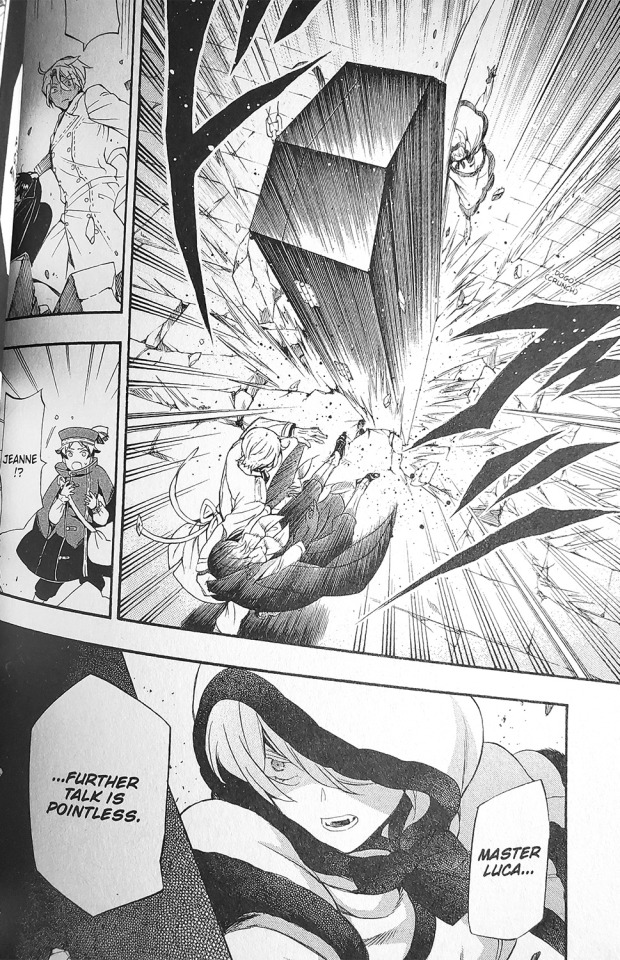
Aesthetically and conceptually, she’s introduced as an active element of the story. At this point, the “forced kiss” scene during the initial fight seems more like a fluke, a comment on Vanitas’s personality (and willingness to do despicable things to get what he wants) rather than Jeanne’s.
That brings me to why I found it so jarring when colored art of her that was subsequently revealed: that agency fell away to portray a visually more passive air.
In the existing full-color art we have of Jeanne, she’s more static in her environment, looking towards the viewer but with a face that looks rather blank, even meek. Specifically I want to point out this wallpaper, which I obtained from the official site fairly early on in Vanitas’s serialization (December 2016), in contrast to another piece of official art that was released of Noe and Vanitas with Memoire 11, around the same time:
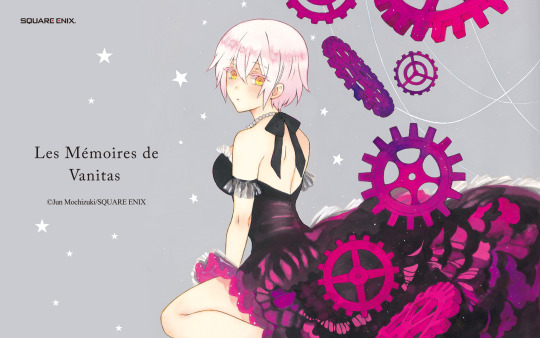
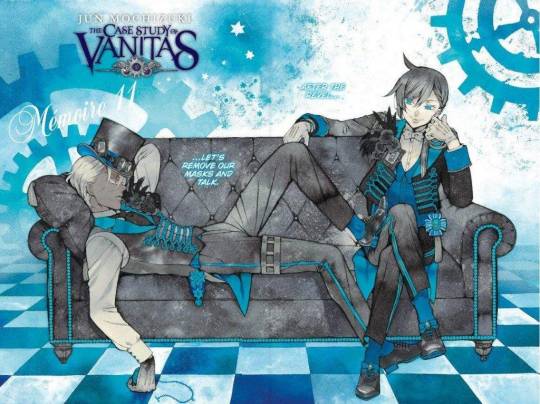
In both cases, the characters are posed intentionally, rather than actively doing something. And, they’re aware of the viewer’s gaze to some extent. However, Jeanne has her back turned to the viewer, and her expression is more idealized and ambiguous. Meanwhile, Noe and Vanitas are rather assertive: their expressions are more intentionally focused, and they seem to know their situation in the artwork. Jeanne is simply passive, very nearly objectified.
...Yeah, maybe this is just my art background speaking. But I also notice something similar happening in other official colored pieces of Jeanne, such as the cover of volume 4.
By this point in the story, lack of agency has become an even more significant element in Jeanne’s character arc: we learn that she’s been cursed. Not only is she unable to speak of the curse, it’s also in direct opposition to one of her primary character motivations, to protect Luca and those she cares about. Due to her uncontrollable urge to kill and drink blood, Jeanne fears that she’ll unintentionally hurt the very people she’s trying to protect.

Jeanne’s involvement with Vanitas also unfortunately comes with a sacrifice of her own agency. Seeing that she’s been cursed, Vanitas demands that she drinks blood from no one but him in exchange for keeping her secret. He further establishes her sense of reliance on him by promising that if he ever does see her lose control, he’ll kill her (so that she doesn’t harm Luca). Whether he’s simply a smitten 18-year-old who doesn’t yet know how to conduct healthy relationships, or whether he’s crafty and intentionally drawing Jeanne in further--or even whether it’s a mix of both--this idea of Vanitas’s control over her is reflected in the cover art for volume 4.
At this point, considering the literal events of the story, Jeanne’s passiveness is not only visual, but symbolic. In this illustration, Vanitas’s hand is grabbing Jeanne by her bow, and functionally by her neck: she’s being dragged along against her will, with little means of escape. And she looks at the viewer with a surprisingly similar expression to the previous illustration: one that communicates little say in the situation.
This matches up with their literal relationship in the story itself. Knowing she’s cursed, Vanitas is establishing her exclusive reliance on him, in exchange for keeping important secrets from others with whom she’s close (i.e. threatening to drive a wedge into their relationship). He’s already pushed himself upon her physically with clearly no warning or enjoyment from her. Yes, he’s been kind. And when Dominique trails Vanitas and Jeanne on their date, she notes that Jeanne is “terribly weak against any sort of kindness.” But in spite of some more “cute” and candid moments, the overall dynamic between Jeanne and Vanitas is far from genuine kindness. Returning to how Vanitas garnered an edge over her in their initial fight--with taunting, carefully chosen words--I would phrase it more as that Jeanne, a borreau trained to kill and inexperienced with matters of feelings, is particularly susceptible to emotional manipulation. (There’s more than a little irony in this internal comment from Jeanne, at the beginning of her date with Vanitas:)
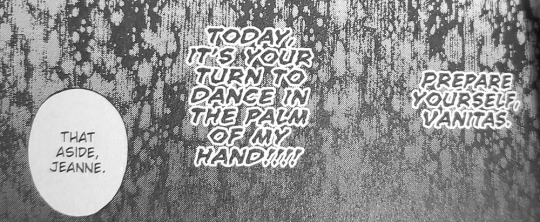
Jeanne’s relationship with Vanitas becoming important isn’t, in isolation, inherently an issue. In most cases, it’s fun to see how a character who usually appears unshakeable is rounded out when we see them at their more vulnerable times. What makes me feel squicked out and worried on Jeanne’s behalf is how it’s executed, considering how it works in opposition to how she was introduced as a character, and how Jeanne and Vanitas’s relationship harkens back to known dynamics of abuse.
In other words, my discomfort is not at Jeanne herself for falling for Vanitas and his tactics. It’s at how she’s introduced with a promise of agency in her own story, and that agency is subsequently taken away in how she’s portrayed in official art, and in plot points as the story progresses. It’s at how their relationship begins to fall into a harmful template perpetuated by rape culture, where a man forces himself upon a woman at first, but she is shown to eventually enjoy those advances even when unwanted. I had high hopes for Jeanne as a character developed with her own agency, motives (and yes, for cool fight scenes that WLW like me can admire), and so far, Vanitas’s effect on her has threatened to overshadow these. This is where I think sections of the fandom throwing accusations back and forth of each other being misogynistic, on the grounds of criticizing Jeanne and her relationship with Vanitas, fail to see the wider issue.
Of course, eliciting this sort of discomfort may even be the whole point. Jun Mochizuki is known for putting her characters through tragic and painful situations, and her previous work Pandora Hearts is rife with unstable, imbalanced, and otherwise less-than-perfect relationships. But even without this background knowledge, a decisive scene that convinces me of the intentionality of this purpose is one I’ve written about before: Jeanne’s internal fantasy as she’s left unattended by Luca and loses herself in a storybook.

Here, Jeanne fantasizes about being the agent in her own story, a position that, the art reminds us, is often occupied by a male character such as a prince. Ultimately, this progression looks innocent and could serve to remind us of Jeanne’s more vulnerable, innocuous side. But including it here in the story could also serve as foreshadowing, a contrast to what Jeanne’s situation is like for her in reality. (If you want to read more on this panel specifically, my analysis is in the source link of this post!)
Essentially, critiquing Jeanne as a character requires more nuance than simply judging her individual characteristics. It’s necessary to also take into account the way that the story treats her and her relationships with others and other forces in the story. Not just is she allowed to be soft and emotional, but what consequences does this have for her, and how do the story elements lead the reader to feel about her being soft?
Personally, I think she’s very likeable as a character--her situation just seems unfair, and I feel like she deserves so much better than Vanitas and his schemes. I mean, she could easily destroy him with her gauntlet, and he knows it! But, then, it’s Jun Mochizuki. We should probably expect to be feeling pain and pity for her characters. Still, the relationship between Jeanne and Vanitas has always kinda rubbed me the wrong way, and I think this pretty much sums up why.
102 notes
·
View notes
Text
the People have requested my book report on The Library at Mt. Char so this is now a Mt Char book club.
if you have not read The Library at Mt Char there is no reason to keep reading. I hope you're having a nice day, stay safe and don't do drugs.
So Mt Char has a couple of problems, but in my opinion only one grave problem.
Not a grave problem:
Erwin doesn't need to be in this book. An astonishing amount of ink is spilled on giving us Erwin's POV and I am at a loss in regards to what that's supposed to bring to the story. I mean, it's kind of neat to see Carolyn's "trick shot" from the POV of one of the people being manipulated, but that perspective could have just been provided by Steve. Everything Erwin does of any plot significance could have been done by Steve, a character who actually matters.
Please note that I don't hate Erwin, he's perfectly fine as characters go, he just contributes nothing, and it is baffling that he and Carolyn get the last scene in the book (instead of just ending on her reunion with Michael, a scene that was emotionally affecting and felt like a natural end point to her story). We are taking no questions, Erwin needed to be cut.
Also not a grave problem in my opinion, but I am sure others feel differently and I understand why they would:
Yo, the scope of what the catalogs cover is mad vague. I mean, I get that that's the point: when you have a character whose magic powers are "anything that has to do with death or murder," that's a broad license, and I'm fine with that. These are supposed to be demi-gods. I don't require a rigorously explicated magic system.
But then like...why can't Jennifer, the healer, also heal minds? That seems weird. Or like, it's implied that she kinda can, maybe, but none of the kids talk about their therapy sessions with Jennifer: they explicitly call out that she heals their bodies. But then she talks about how Margaret and David are sick (meaning mentally) in a way she can "no longer help?" Aren't you supposed to be the God Of Healing? Why can't you help anymore? And were you actually trying to help them before - or anyone else? That's never shown. You could have just said you only healed bodies, not minds, but then it's repeatedly implied that she CAN diagnose mental and emotional problems (and therefore should probably be able to do something about them).
So that's weird.
Or like, why is there Alicia, who "sees the future," and Rachel, who "sees possible futures?" That, uh, just sounds like the author was running out of ideas. Also, if Alicia could see the future, she probably shouldn't have been in that house when the SWAT team hit, yeah?
Stuff like that. The magic the kids can do is very "they have the powers the author needs them to have when the author needs them to have them, and they can't do anything the author would find inconvenient for them to do" but that's not a deal breaker for me because overall the vibe being put off by their various magical specialties works for me. Still, there were ways of getting us where we needed to go without begging quite so many questions.
Also not a grave problem, although more of a problem than the other stuff:
You know that anime trope where a super-genius character is having an entire conversation with another super-genius character through a screen, and it's revealed that the whole conversation was a distraction and pre-recorded so that Character 2 could Complete His Scheme against Character 1? And used his super-genius brain to predict every single thing Character 1 would say? And your suspension of disbelief staggers bloodied into the alleyway and collapses because you're really trying to hang in there, Code Geass, but that's fucking stupid, you're asking for me to believe that this character's intelligence is flat-out supernatural now and you've given me no reason why that should be?
That's how I feel about Carolyn, by the time she takes over the Library. Like, okay. The kids canonically have not even been at the Library long enough for any of them to master their catalogues except for Jennifer. None of them but Jennifer are masters of even their own subject.
Carolyn has been studying in secret from multiple catalogues - which is cool! I like how she slowly reveals over the course of the latter half of the book that she has powers from other people's specialties.
...But like...
She seems close to mastering her own catalogue. She is a competent healer and can raise the dead (Jennifer's catalogue). She can block attempts to read her mind, beats David in a fight, and understands how to kill Father (David's catalogue). She speaks lion and controls the dogs that surround the Library (Michael's catalogue). She could make the mathy "Denial That Rends" thing that kicks off the whole plot, and she can make a new sun and correct orbital rotations around it (Peter's catalogue). She can predict the future with such specificity that she knows how to cause Steve to drop a clip of bullets while he's being attacked by dogs exactly where Erwin will need to pick it up later (Rachel's catalogue, also this one is stupid, she could have just given Erwin an extra clip or something, but whatever).
That's half the catalogues. Carolyn doesn't seem prodigiously more intelligent than the other kids. She's smart, sure, but they're all weird demi-gods with a genius for their specialties. The rest of them haven't even mastered their own catalogue, and I'm supposed to swallow that Carolyn has attained 'competent or better' status in six? When she has to research five of them in secret? Without falling behind in her own studies?
It would be fine if they had all been masters of their own catalogues for years and years; that would mean they would begin to stagnate, while Carolyn kept learning. But that's not the case. By the end I wasn't impressed anymore at Carolyn's resourcefulness, it just felt like she could do anything and everything, shh, don't ask questions, she's the Chosen One so she just can.
The reason this isn't a grave problem to me is because Carolyn's journey isn't about becoming more powerful: it's about her emotional journey, which isn't affected by her being stupidly OP for no reason by the end of the book. She still sucked at the things that mattered, like "feelings" and "relationships" and "not being a shitty person." But I do think it hurt the story. I should be cheering on my protagonist when her wild schemes come together, not rolling my eyes.
Anyway. All that was the aperitif. Let's talk about
THE GRAVE AND GLARING PROBLEM AT THE CENTER OF MT CHAR.
So everything that happens in the book stems from Carolyn's thoroughly justified hatred of Father (and David, but David was made that way by Father). Father treated her, and all of the other kids, with extravagant cruelty. If you haven't read the book in a while, here's a sample of the kinds of things Father did to the kids, or, if David did them, that Father did nothing to prevent:
- Cooked David alive over 2 full days in a giant bronze bull (and made the rest of the kids bring the fuel)
- Put Michael's eyes out with a hot poker every night for 2 weeks (and made the rest of the kids watch)
- Murdered Margaret every few days, often in drawn-out and painful ways
- Made Rachel repeatedly give birth, raise the babies to about 9 months, then murder them with her own hands
- Allowed David to rape all 11 of the other kids (except Jennifer, probably because she was the healer and he wanted to stay on her good side)
- Allowed David to crucify, brutalize and rape Carolyn and Peter
- Gave Carolyn a loving new family for a year when she was nine years old (those two deer), then had David murder them in front of her and blame it on her for not remembering her homework well enough, then served the two deer at a feast to 'celebrate' her returning to the family
- Whippings, skinnings, and bone-breakings as standard disciplinary actions
Whoo-ee! Okay! We are talking about mythological cruelty. I am fine with this! The story takes place on a mythological scale. As outlandish as all of that is, the cruelty feels proportionate in a story about killing and replacing god. Father is cruel, indifferent, controlling, and alien. I have no questions, Carolyn please proceed with your revenge. We seemed on track for a tale in which Carolyn defeats Father, but in doing so she runs the risk of becoming him. Will she step back from the brink and retain her humanity after all of the trauma and brutality she's endured? Let's find out!
And then
and then.
Oh boy.
And then.
...It turns out, Father is a good guy after all.
And let me be clear: THIS IS NOT, IN AND OF ITSELF, A PROBLEM.
By the time you learn that Father is actually benevolent, and loved those kids, and cares about being a responsible steward to the world, and tried to leave the universe a better place than he found it, and genuinely regretted the suffering he inflicted on them when they were growing up, it feels kind of...natural? Like, I was surprised, but also not, because there were 90 pages of book left and Carolyn had already become god. This seemed like a thematically meaningful place to take the rest of the story.
It turns out Father was training Carolyn to replace him the entire time. He had to make her hate David because it was important that she "defeat a monster" on her path to becoming god. (It's not explained why she had to defeat a monster, but sure, okay; it's the kind of mythic feat that fits with the story we're in.)
Why did he choose Carolyn to be his successor? Well, originally he chose David, but David wasn't strong enough: every time Carolyn was the monster in David's story, she defeated him, and went on to rule the universe as an unspeakable tyrant. Since Carolyn always won, Father swapped their roles. He knew he had made the right choice when he put David into the bronze bull, and heard David begging for mercy: because when Carolyn had been the fated monster, she had never begged.
...Okay, so...hang on.
Hang on.
The only rule that we've established on "how to become god" is "you have to defeat a monster," right? I'll even grant you for free that it has to be a monster who is personally meaningful to you, although that part is never stated. Overcoming a great evil which has cast you down and abused you many times before, sure, okay.
...Why the FUCK did all that other awful shit have to happen??
I did not have this question when Father was just evil! That was a good enough explanation! But now that he's not evil, you HAVE TO EXPLAIN why he treated all of the kids so brutally!
Like dude you're GOD. If you need a monster for Carolyn, I'm sure you can make that happen without TORTURING CHILDREN FOR DECADES.
There didn't even need to be any other children! You could have two kids: the languages-kid, who is the chosen one (the chosen one has to be the languages-kid so they can read the Onyx Codex or whatever it was called at the end, the one written by Original God), and the war-and-murder kid, who is the monster. They could have just been forbidden to read the other codices, if it's important to you that your chosen one still prove her resourcefulness or whatever.
Why include all of the other kids??? It wasn't to give your chosen one a sense of family: Carolyn didn't feel close to any of them except for Michael (who I liked, but whose contribution to the plot was negligible).
Or keep the kids! But then why make them, and Carolyn, hate you?? You could just say, "Hey Carolyn, I am raising you to be my successor, you have to figure it out yourself because part of proving your worthiness is this kind of abstract, big-picture thinking, but I love you and whatever you end up deciding to do, just believe in yourself." And meanwhile you're off torturing the fated monster in order to get him piping hot and ready to be served.
Was the idea that Carolyn had to endure so much horror in order to prove she was 'tough enough' to be god?? Because that's not how trauma works! Kids who have been brutally traumatized are usually not made tougher by the experience! A fact that even the book understands, because 10 of the 12 kids are completely destroyed by their upbringing (I'm giving marginal exceptions to Michael and Carolyn herself).
And like
if Father doesn't have a good reason for having treated them so badly, the whole book falls apart!
Because getting revenge for that cruelty is Carolyn's whole motivation!
We are clearly supposed to feel okay about Father going to make a new universe at the end of the book: he's going with his cool tiger friend and that little girl with the connection to the elemental plane of joy who used to be the sun, he's happy to see Carolyn embracing compassion and kindness, which means he cares about compassion and kindness. He invented light and pleasure. Carolyn does nothing to try to stop him from going. He seems like a pretty good candidate for god. And I do feel okay with him leaving! I was convinced! Father is not evil after all!
But then you have! to explain! the abuse!!
It can be a throwaway line!! "Carolyn realized that everything she and her siblings went through had to happen the way it did, because [X]," embedded in the middle of a paragraph! That would have been enough! But I need an explanation!
"They were raised the way Father was raised himself" WHY? He was raised by the Emperor, an on-the-record awful fucking dude! Father proceeded to rule the universe in a far more benevolent way than the Emperor did, why would he feel like he had to raise his kids the way the Emperor raised him?
"Carolyn needed to overcome challenges on her path to godhood" how is TRAUMATIZING HER SO BADLY SHE ALMOST BECOMES INHUMAN - SOMETHING YOU WERE OSTENSIBLY TRYING TO PREVENT, see Steve being preserved as something that could give her hope, etc - A "CHALLENGE??"
Again, none of this is a problem if Father is just evil! YOU CHOSE to make him not evil! And that's fine!! I think it's a good choice for the story actually!! But then you have to, you have to, HAVE TO explain why all of that bad shit happened!
Because all of that bad shit is the reason Carolyn made there be a story.
And it turns out it doesn't make sense.
50 notes
·
View notes
Text
Alright, so onto chapter 2 of “No Regrets”.
I want to talk a little about these opening panels, when Levi, Furlan and Isabel are being driven to HQ by carriage. They seem unimportant, but I think they’re actually really important in understanding Levi’s psychology going into this new situation they’re all in.
We see the interior of the carriage, with Levi and the other two, along with an escort from the SC. Furlan and Isabel are both looking out the window of the carriage, and in particular, Isabel seems incredibly excited and in awe of the passing view. She’s stood up, with her face pressed to the window. And in the next panel, we see her looking at a little girl with her mother, dressed nicely and holding a doll. This really encapsulates everything Isabel herself has probably never had. A reliable mother to take care of her, fancy clothes and toys to play with. Essentially, an actual childhood. We see Isabel’s face in the window, and her mouth is open in wonder, her eyes wide. Like she can’t believe what she’s seeing. It emphasizes the depravation and lack of privilege she’s endured all her life. Meanwhile, by contrast, Levi sits there with his head bowed down, ignoring the passing scenery, looking deeply unhappy, even depressed. When he does look up though, he sees Isabel looking out the window, and on the close up shot of him, he’s got an almost thoughtful expression, if still extremely dour. No doubt, Levi is feeling uneasy and uncertain about the situation they’ve all gotten themselves into here, but I’m also sure that he’s unable to ignore the bubbling over excitement of Isabel, her obvious joy in being, at last, on the surface. I’ll get more into this later in the post, when we see Levi really considering his friends and their dreams, and how it influences and dictates his own decisions.
But first lets talk a little about Erwin and his role in all of this.
Now at the time this series came out, Erwin’s actual, motivating reasons for doing what he does weren’t yet known, so it’s interesting to read into his actions in this story with that context. I have no doubt that Erwin really DOES care about humanity, and wants to fight for it, and its salvation. But as we come to learn from the main series, he places his own dream of proving his father right about the existence of human’s beyond the walls above what’s best for humanity, and it puts his actions in this story into an interesting, if harsher light.
No doubt, Erwin is a master manipulator. He plays both sides expertly against the middle in this story, and I’ll get more into it by the end, when his actual plan is revealed to Levi. But what I don’t see often discussed is how, exactly, Erwin got all the parts moving in the direction he wanted, to obtain a specific outcome, and how he pretty ruthlessly uses so many people as pawns to do so. It’s obvious from the context of what we later learn in the story that Erwin first spread a rumor about having evidence against Lovof stealing funds in order to force him into tipping his hand by trying to make a preemptive move. What I see people miss all the time, or at least, fail to discuss, is how Erwin also, at the same time, made it public knowledge within the Capital, that he would be going after a group of thugs in the Underground who had shown exceptional skill using ODM gear, and that he would be making contact with them as soon as possible to try and enlist them into military service, and how Erwin made these plans public specifically to encourage Lobov into seeking out Levi and his friends for the exact purpose of both implicating Lobov in a crime, and gaining Levi’s and his friends strength for the SC. One, by hiring a group of criminals to steal from Erwin and attempt to assassinate him, so he could use that as leverage in case he wasn’t able to obtain proof of Lobov’s further criminal activities, thus having two means of getting rid of one of the SC’s biggest threats, and at the same time, also manage to score for the SC the exceptional skill of Levi and his friends through forced enlistment. He even says to Zackely at one point “I intend to make use of anyone who has even the smallest potential during this expedition.”. Erwin manipulated and had control of this entire scenario from the start, and from behind these scenes moved all of these people exactly how he wanted to, to achieve his goals. That’s pretty impressive, but also pretty scary. Well, I’ll talk more about all of that when we get to it later on.
Back to Levi and his friends though.
We see them arrive at the SC HQ, and a really important conversation happens between Levi and Furlan.
Furlan seems like he’s almost bitten off more than he can chew here, beginning to express his concern to Levi about what joining the SC actually means, before Levi cuts him off, telling him he’s got no intention of enlisting, and that he only agreed to come along so that he could get closer to Erwin and then kill him. I think Levi genuinely felt murderous towards Erwin at this point, and really means what he says here, at least about killing him. Though given the end of chapter 1, with the significant look shared between Levi and Furlan, and Levi’s begrudging acceptance of Erwin’s offer, it’s obvious that Levi also agreed to come because that’s what Furlan wanted him to do, to give them the opportunity they needed. Levi’s just feeling incredibly emotional here, I think, with the way Erwin treated all of them hot on his mind. Furlan tries to implore Levi to forget about killing Erwin, that it isn’t necessary anymore because of his own plan, and the almost certainty that Lobov and his people won’t ever try to make contact with them again. He tells Levi, if he just listens to him and follows his plan, “I know it’ll work. Trust me, Levi.” Furlan asking him to trust him pulls a meaningful look from Levi, seeming to break through Levi’s angry insistence on killing Erwin. This is where the manga improved on Levi’s characterization and motivation by leaps and bounds over the visual novel, because in the next few panels, we see Levi walking away, with Furlan calling after him, concerned, but we get to see Levi’s inner thoughts, and he’s remembering specifically Furlan insisting to him that “one day, we’ll get outta this trash heap and live up above.” We see Levi thinking about Furlan’s hopes and dreams in these panels, and he has a saddened, and guilt-ridden look on his face, like he feels bad about having dismissed Furlan’s plans back there in favor of his own plans for revenge. We didn’t get any of this in the visual novel, instead the text there making Levi look like he refused to consider anyones position but his own in this whole situation. But here, Levi is clearly concerned with and considering Furlan’s desires.
We go into a flashback then, with Furlan explaining to Levi his plans, telling him that “nothing’s gone according to plan... But with you here we’ll really be able to raise hell.” Furlan’s trying to explain to Levi that since he now has Levi’s strength to rely on, they can actually get something done once they get into the Survey Corps. It almost seems like Furlan’s been planning on trying something like this, or at least, had some sort of loose plan about getting to the surface, even before he met Levi. It’s obviously something he’s been dreaming about for a long time.
Then Isabel comes back, and she’s been roughed up and assaulted, and we learn from Furlan asking her if she went to see those “low-life scumbags again?” that this has obviously happened to her before, that she’s been associating with some bad people and it’s gotten her hurt. She denies it and lies about having just tripped, but clearly neither Levi or Furlan are buying that. Levi asks Isabel what happened to her hair, and Isabel reacts badly, running away and hiding in her room. We get a close up of Levi holding a knife in his hands, foreshadowing his own intentions. Later that night, Furlan hears Isabel crying in her room, and her chanting to herself over and over that she’s going to “kill you”, presumably meaning the men that hurt her earlier. Furlan stands there lamenting that he thinks both Levi and Isabel are going “mad”, and that all they can think about is dragging everyone else down to where they are. He’s obviously terrified that he’s going to lose both his friends to the savagery and ruthlessness of the Underground, that both of them are going to end up becoming lost to their own anger and pain. He starts to say “That’s why I...” before Levi suddenly comes back in, holding a bloody knife, clearly having returned from exacting revenge on the men who hurt Isabel. Furlan asks Levi “Did you kill them...?”, and Levi doesn’t answer, but we see a completely resigned, even sad look on his face. This of course is the world Levi comes from. It’s the world he was raised in. A world of kill or be killed. Levi must have figured, if he didn’t go out and kill those men that had hurt Isabel now, then someday, they would end up going too far with her, and kill her instead. But Furlan clearly doesn’t understand, and doesn’t relate to that kind of mindset, despite coming from the Underground too. Of course, Furlan wasn’t raised by Kenny the Ripper either. This is how Levi was taught to deal with his problems, and Furlan can only see him spiraling into an abyss from which he fears Levi won’t return.
We cut back to the present then, and Levi is sitting up on the roof of the SC HQ, again remembering Furlan’s words about “This is our chance. Trust me.”. Getting to the surface and finding better lives for themselves is Furlan’s dream. The fact that Levi keeps remembering it, keeps remembering Furlan insisting and pushing the idea of the possibility of living on the surface, shows that this is probably something he would talk about all the time with Levi, trying to get him to agree to it, to believe in it. Once again, Levi is contemplating the hopes and dreams of his friends. We get another close up of him holding a knife, and it represents, I think, his struggle between his desire for revenge against Erwin, and his desire to help Furlan realize what, to Levi, is probably an unrealistic goal.
We then get Furlan and Isabel joining Levi, commenting on how beautiful the night sky is, and asking Levi how he could keep it to himself. Levi snips testily at Furlan that him and Isabel are so loud, that he’d be too irritated to get any killing done, and then Furlan looking clearly unsettled by the remark. But it’s obvious, given the context of the previous panels of Levi’s thinking about Furlan’s dream, that Levi is just being peevish and saying things out of frustration and confusion. He doesn’t really mean what he says here. He’s taking his frustration out on Furlan by saying what he knows will upset him the most. What this also tells us is that Levi is very much aware of how bothered Furlan is by Levi’s willingness to kill. He isn’t at all oblivious to it, and given his resigned, saddened expression after coming back from killing the men who assaulted Isabel, I would say Levi even understands Furlan’s dismay. That’s a glimpse at Levi’s famous compassion.
The next panels show the three of them bonding, sitting together and admiring the night sky. Isabel asks Levi if the stars are as pretty as where he used to live. I’m just going to chalk the mistake in continuity here up to this manga coming out before, I believe, Levi’s backstory of being born in a brothel in the Underground was established by Isayama. Regardless of this mistake, this is an important moment between the three of them. You can see the awe and wonder they all feel, looking up and seeing the sky fully for what has to be the first time in all their lives. Remember, all three of them have lived literally underground their entire lives, with little to no sunlight, stagnant, stale air, hideously unclean living conditions, etc... It must be overwhelming to them , just to see nature in all its splendor like that. It’s after sharing this moment together that Levi tells Furlan that he’s decided he won’t kill Erwin for now. He looks at him and says “I’m going to trust you.”. And Furlan smiles at him, clearly happy and relieved. This scene is really important, because we’re seeing Levi choose Furlan’s dream over his own desire for revenge. We see Levi place Furlan’s desires over his own, which is totally in line with how Levi is in the main AoT storyline. He decides his revenge can wait, that it’s not as important as helping Furlan achieve his goals. What’s particularly remarkable about this, I think, is that it doesn’t appear that Levi ever dreamed of going to the surface himself, and likely that he never even considered it a possibility. So just like Levi fights, later on, for a world without fear and violence, for humanity’s salvation, even as all his life experiences tell him it likely isn’t possible, we see the Levi doing the same here, deciding to fight for his friend’s dream, even as to him, it seems unrealistic. It’s obviously a pivotal moment too, when Levi tells him he’s going to trust him, because this ties in hugely with the theme which applies so much to Levi throughout the whole series, of never knowing if it’s better to rely on himself solely, to trust himself, or to trust and rely on his friends and their capabilities. Levi chooses, here, to trust in his friends, and that will obviously have it’s own ramifications down the line. Again, this is an area in which the manga improves radically over the visual novel, which had no instances whatsoever of Levi struggling with the question of the choices we make, which is absurd, since it’s one of the driving factors behind who Levi is, and how he ultimately came to see the world as he does. It was precisely this struggle between choices, between trying to choose correctly, giving so much thought and effort to our choices, and still sometimes coming out wrong, that shaped Levi into being able to accept his lack of control and instead of regretting it, using it to keep fighting.
Anyway, I’ll get to chapter 3 tomorrow.
#attack on titan#shingeki no kyojin#No Regrets#acwnr#Levi Ackerman#isabel magnolia#furlan church#Erwin Smith#meta#snk analysis
23 notes
·
View notes
Text
Yayyyyyy analysis time!! This is gonna be chaotic and long lol
disclaimer: I have already looked at and responded to predictions by @darkwingdyke, @ibelongtotoomanyfandomsblog, @bringina, @halfasleepheadcanons and @animerunner so some of that definitely will slip in here--but go check theirs out too! :)


Starting from the VERY TOP, we have the flaming door eye! We know that in s1 Luz burned the door in her attempt to stop Belos from using it, but we also know that he’s been reconstructing the pieces anyways. The eye being on fire could definitely relate to that. I think another important thing no one’s pointed out yet is that the eye’s pupil grows smaller as it opens. When pupils grow smaller, they’re adjusting to the light. I think this could definitely be foreshadowing something about the completion of Belos’s reconstruction or maybe is connected to the common good/evil light/dark parallels we see elsewhere in the show. Also, the eye’s shape has changed--previously it was rounded, but now it’s shaped more similarly to Belos’s
Next, there’s the character intro updates. We start with Luz looking stunning in her cape, and powerful with her glyphs. Then we have Eda struggling with her spells. She’s trying to hold onto her staff magic here, and I wonder if her possible resistance to Luz’s type of magic (even though it could help her) is going to be a plot point in the show. I also know in the show we’re going to explore King’s background which I’m excited for, but I don’t think there’s anything here that provides any information about that.
Following our protagonists, we have level-ed up Willow, Gus, and Amity! Willow is shown to be incredibly powerful in her shot, but nothing we haven’t seen in the show so far. Hoping we’ll get to see more of Willow busting out her immense power in s2.
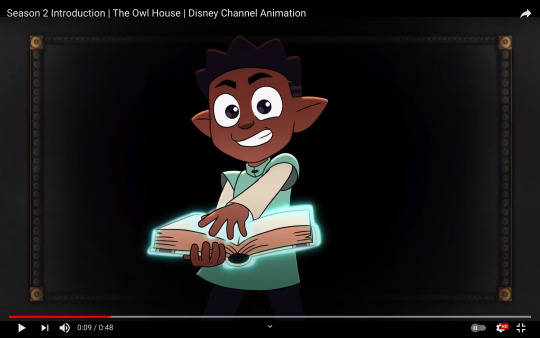
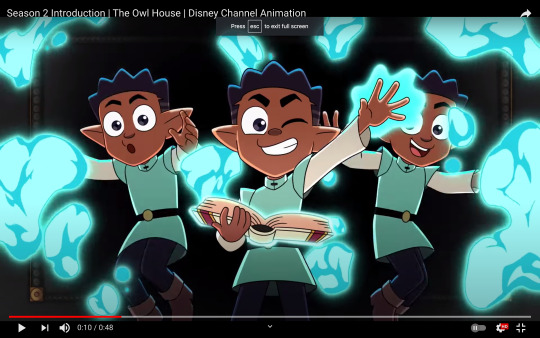
Then we have Gus, casting from a book--and also hinted to be more powerful than previously. Unlike Willow, we’ve never seen him cast circle-less in the show before. That combined with the fact that he’s touching a book makes me think he might be using the glyph magic as a sort of power booster (similar to the construction coven’s power glyphs). I think something else that supports this theory is that his magic clouds look awfully similar (right as he casts them, at least) to Luz’s paper crumpling up and turning into magic. I also want to note the use of 3 here--as others have pointed out, it seems to be becoming an increasingly significant number in the series.
Lastly, we have Amity. Like Gus and Willow, she’s also shown to be casting circle-less here, though unlike the others I don’t yet have an explanation as to how or why. I do however wanna say she looks amazing and I love her and I can’t wait to see what she does in s2 <3
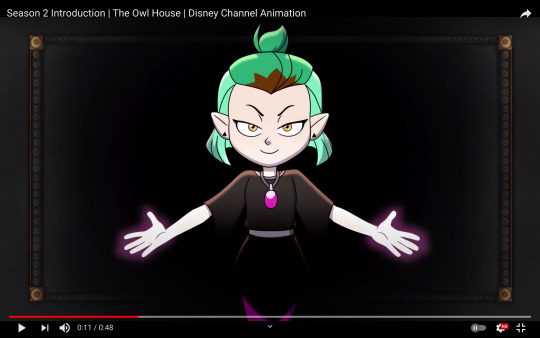
Also, I want to note that she’s wearing a gemstone on her outfit. I think it’s unlikely, but given how we’ve seen gemstones reflecting Eda and Lilith’s power (especially in relation to the curse) it’s possible that the necklace may become a similar symbol.
Following Amity, we have our new 3 cards. Most of the fandom seems to think that in s2 they represent the main antagonists (and I agree lol) but if we think about parallels to season 1 here those 3 were the main side characters, who all ended up being good-aligned. However for the sake of all my other thoughts let’s assume they’re the antagonists.
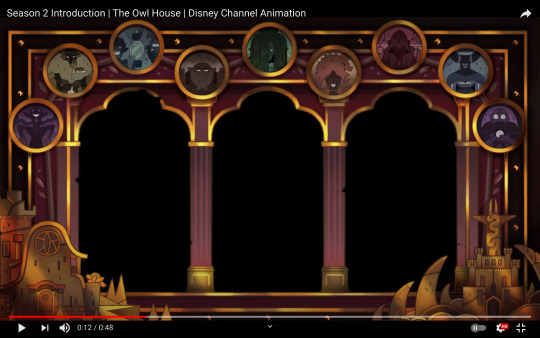
Starting with the frame, we already see many more details. As @bringina pointed out, not only do we see the leaders of the main nine covens above (also, the illusions guy looks an awful lot like Gus--could it be Perry Porter?) we also see the owl house on the left and the emperor’s castle on the right, which could suggest the alignments of the characters seen.
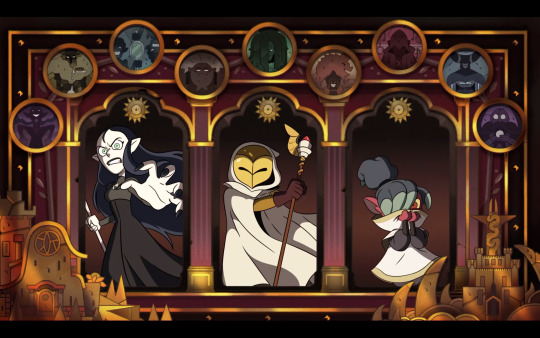
They appear left to right: Lilith, guyinowlmask, and Kikimora. In the first slide, we see s1 Lilith--antagonistic, scary, and with a singular eye color. We also see the other 2 characters in their s1 forms: I know owlmaskguy wasn’t a character in s1, but his outfit could have definitely had him as an easily missable background character, and Kikimora has her face covered as she did throughout the first season.
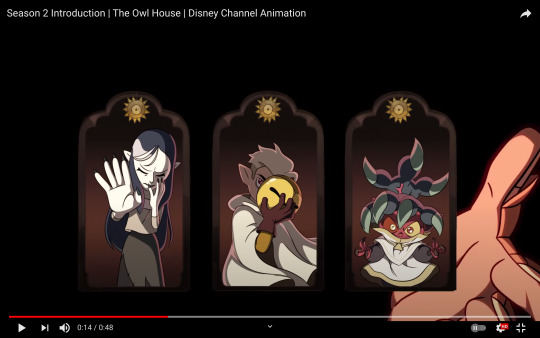
The cards then flip and the background fades out to reveal Belos’s swooping hand. Now we see Lilith looking pained in raggedy clothes, owlmaskguy with his mask now off (he looks young--I could see him being disguised as a student at hexside) and Kikimora gone wild. To do a quick dive into Kikimora’s appearance--her hair almost looks like 2 claws, the upper one having a visible vein. She also now has heterochromia, as do Lilith and Eda after sharing the curse. She’s Belos’s right-hand man (also interesting to note it’s Belos’s left hand that swoops in to light fire to her first) so I think it’s possible he could have made her cast a similar spell to help him with one of his ailments.
We then see Belos’s face shrouded in fire, with his mask now fixed of the crack Luz gave it. He lifts up his arm and the sleeve of his outfit serves as a transition to full Belos calling lightning from the sky--clearly we’re going to see more of him in s2.
Then we transition again to Luz’s flying sequence from before with the only visible difference being the sunset lighting. I’ve seen 2 theories on this: 1) darker lighting foreshadows a darker season, 2) sunset is one of 3 times (daylight, sunset, and night) and so we’ll see this at night in the third and final season.
We then end it similarly to the s1 intro, with the only 2 differences I noticed being more vibrant colors and Eda’s heterochromia.
That’s all, folks!
I might also do a poster analysis later, but in the meantime go check out more theories! Everyone has been so creative in their predictions and who knows what we’ll get right :)
#s2 predictions hoot hoot#mine#toh#owl house#the owl house#owl house season 2#toh s2#owl house s2#luz noceda#king#eda#lilith#amity blight#the owl house s2
52 notes
·
View notes
Note
What do you think of Mustafa's relationship with his aunts and who do you think he is closest to? He always struck me being closest to Hatice and the two having a unique bond.
Mustafa has a good relationship with his aunts, based on what we see in the show. They truly care for him and think of him as the future of the dynasty, they always strive to protect him from trouble, they're always concerned for his wellbeing. He's also the one they have the most interactions with out of SS's children, which makes their soft spot for him even more evident. Mustafa, in turn, is fond of his aunts, too, even those he doesn't have so many scenes with. They're certainly a part of his familial bonds and he's nice, polite and welcoming to them.
I agree that Mustafa has the closest, most fleshed out relationship with Hatice. She seems to be the aunt he was closest to even when he was little and both have already gained a strong bond pre-series, shown by how he was eager to see her along with Valide and Ibrahim before he arrived in Topkapi in E01. He was sensitive to her struggles as much as he was to his mother's, they were doing many activities together like playing in the garden, giving out gold for Mahi's pregnancy in E03 etc. and it felt like Hatice was always ready to play with him and cheer him up. They were there for each other in good and bad moments. New aspects of this bond were constantly uncovered the more we went and Mustafa growing up and Hatice's character development revealed a strong trust between them, as seen by Hatice sending him to bring back Ibrahim in E51 like he truly was the only one she could lean on then. We saw that Mustafa's experiences impact Hatice a lot: she wouldn't ever bear to have something bad happen to him and she would act strongly if it does like in E101. She wants and encourages him to act against injustice, as seen by E85-6 when SS didn't bring him on a campaign. Mustafa relies on her enough to share some of his worries with her, respects her love with Ibrahim and just wishes the best for her. He truly wanted for her to stay in Manisa with him and let go of her grief for Ibrahim's death, but also sympathized with her desire to go back in her castle to preserve his memory. Their bond really was unique and amazing and I loved how much they value each other. Their interactions were always heartwarming and cordial.
It was very strongly implied that Fatma was Mustafa's second closest aunt. He trusted her enough to send her in the harem to defeat Hürrem and hope she would pull it off and was in good relations with her anytime they saw each other. Fatma herself was very devoted to the promise she made to him, to her cause. She cared for him so much that she saw his death as her own failure. He was definitely precious to her and way more than her other nephews: while she had a soft spot for Cihangir, she was more than willing to make the rest a part of her schemes. The only thing missing is that their relationship wasn't as explored, I often wonder how did Fatma become so close to Mustafa in the first place. That sure is a curious story I sometimes wish we were told.
Mustafa and Şah didn't have much material, but their relationship still felt decent enough. Şah was clearly the more active force of their dynamic: she wanted to visit him when he and Mahidevran were in the castle, she cared for him enough to advice him not to put himself into danger the way he did in E91-92 and she kept in touch with Mahidevran to both tell her the latest news and know what's happening around him. (It's telling that the only link Şah and Mahidevran have is precisely Mustafa.) Mustafa too respected her and was cool with her, but no truly significant moments. One could argue that Şah's stance of Mustafa could be a little rocky when she used him in a scheme against Hürrem in E85-6 and I would get that when she isn't as biased to him as her sisters, but then again, there wasn't any other way for this plan to be carried out and the first thing she did when SS learnt about it all and interrogate her, was to protect him after all. So yeah, they get along just fine, but it just wasn't as prominent as the others.
I'm sad that Mustafa barely had scenes with Beyhan. :( They both seemed to be in good terms and have a warm goodbye when he was leaving for Manisa, though.
#magnificent century#muhteşem yüzyıl#muhtesem yuzyil#sehzade mustafa#hatice sultan#fatma sultan#sah sultan#beyhan sultan#ask#nurbanu-baffo
18 notes
·
View notes
Note
Why is everyone blaming the editor for the few latest chapters writing? He became horikoshi's editor last year in september and the manga's writing was fine until the nagant fight, everyone shitting on him because he used to be the editor for samurai 8 but the manga got canceld because kishimoto was given too much freedom it's not the editor's fault. I honestly don't understand why everyone hating on him for no reason.
I don't know this editor or anything about him, so I don't feel compelled to defend him. And I don't know anything about Samurai 8 either. So I can't comment there. But trust me he's not getting hate for no reason.
Just because he took over in September doesn't mean that's when he started influencing the writing. I highly doubt Horikoshi did not already have most of the war arc finished up before it was published, especially the Touya reveal chapters.
The quality of the manga really started to decline after the Todoroki chapters and the chapter where the "beginning of the end" started--so Chapter 306. All of that seemed to fit pretty fine, it seemed like something he didn't decide to do last minute. It felt like he had it planned.
And as much of a mess as the Todoroki chapters were--I wouldn't blame it on editing. I blame those on Horikoshi deciding to make Endeavor more redeemable by trying to retcon way too late into the game--and the screwing up of the timeline could have been an honest mistake. I'm thinking it was because he said he's fixing it in the volume release which means he still wants us to go off of the original timeline--Touya dying after Rei was hospitalized. I'm assuming it's the author's exhaustion mixed with trying to fix Endeavor too late. But I digress...
As for this editor's influence:
Have you noticed that the story is putting an unreasonable amount of focus on Hawks and Endeavor? Have you noticed that Hawks and Endeavor are two of the most popular characters in the franchise, and that there's a movie coming out where they are a huge focus of it? And have you noticed that Hawks and Endeavor getting this much focus on the manga is seriously ruining the story quality and the plot progression? But pleasing some readers who--in my opinion--don't care about the story quality but only care about their character getting screen time? (Oh and don't even get me started on that ONE random Shindo chapter because of that character poll.)
It's because they should NOT be getting this much focus. They are not playing the part in the plot they should be playing. Hawks was dead-set onto the path for a heroic death. He kinda still is--but it's now up in the air if Hori will follow through on that. He killed Twice and was shown to be immensely in the wrong for it, but now the story is pretending it never happened. The story is handing EVERYTHING to him--excusing him of things he shouldn't be excused for. And I'm going to boldly GUESS that this is in order to keep readers from getting angry over Hawks's character falling deeper into the cracks--for now. He still may--and he should because this lack of attention paid to what he did is seriously ruining his character for me. And throwing Hawks in to save Lady Nagant after she exploded, it's just pointless screen time for him. His character would be better if he was given substance and shown to react to the world he is in instead of being written to just follow Endeavor unquestionably with no reserve about it and have the story just BACK THAT UP. He deserves better writing and he's not getting it.
Hawks and Endeavor being the focus of the plot has done NOTHING to move the story forward. HOW has it?? Midoriya's quirks could have been discovered with literally any other characters being focused on alongside him. All this going back and forth between Midoriya and them two has literally put the story at a stand-still between the main character moving forward, and the pro-heroes just defeating little side villains in the streets. NOTHING significant has happened or moved anything forward in ten chapters.
I can't honestly say for sure it's fan-influenced. But Hawks and Endeavor are getting their own movie right around the time that this shit in the manga is happening. It just FEELS like advertisement for these two characters. And while Horikoshi has had shitty arcs before (JTA I'm lookin at you) I haven't really seen him straight up ruin his story for the sake of two characters.
Hawks and Endeavor have effectively eaten Shouto's arc for now. We should be seeing Shouto battle is internal struggles about his villain brother. Not Hawks and Endeavor ignore the fact that Endeavor just confessed to the world he beat his wife and children and not mention his son ONCE since the hospital chapters. It doesn't make any sense. The story FEELS like it is literally on hold in order to promote these two characters and that is definitely editor's influence. On top of that--the style that the story is being told in now. All these flashbacks, all these cliff hangers that get really really old after a while---I'm sorry but with the timing of the editor taking over, and the quality of the chapters falling into the toilet I have no choice but to blame the editor. If I blame Horikoshi alone then I'm basically saying I have no faith in the rest of the story and I should just stop reading now. And I don't want to believe that. I don't believe that.
Issues as a writer aside--Horikoshi has been telling a good story and he's been doing what he wants for the most part. Saving his villains, challenging the status quo, calling out real life issues in the story through allegories. He's been doing it, but this ridiculous bullshit that is happening RIGHT NOW I'm going to blame on the editor and hope to GOD that Horikoshi starts doing what he originally wanted to do with his story in the next arc. I think he will. I'm not worried about it, but that doesn't mean I can't bitch about what's going on now, because Hawks and Endeavor are literally RUINING the story for me personally right now and have been for several weeks and I'm betting money it's this editor's decisions.
I'm not saying the story is doomed for having this editor. I'm saying that right now it feels like a bunch of advertisement for these two particular characters to make the audience happy before getting back to what really needs to be written. I have no doubt that it is going to shift back into normalcy where it's focusing on Bakugo, Shouto, Ochaco, and Midoriya working toward their goals of saving their villains. But honestly what is this focus on two of the most annoyingly popular characters doing for the endgame of the story? Nothing.
38 notes
·
View notes